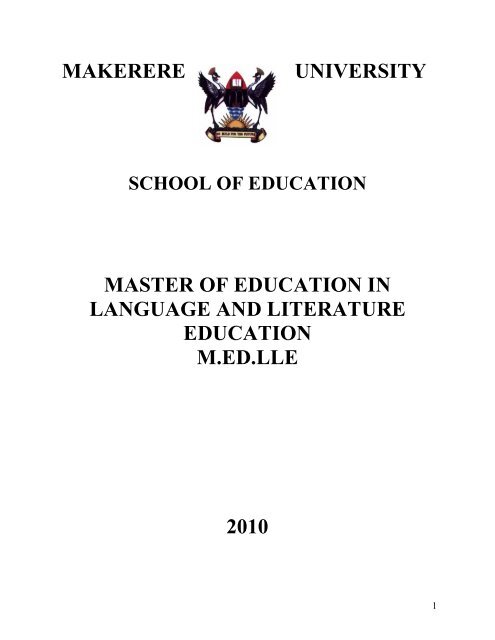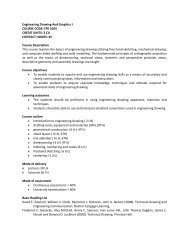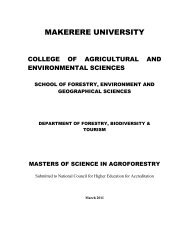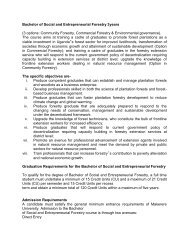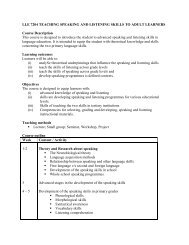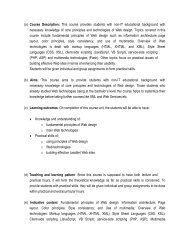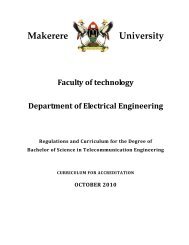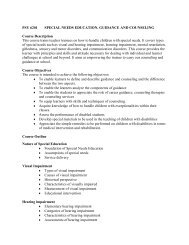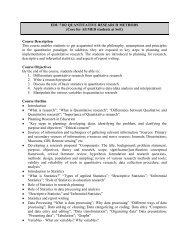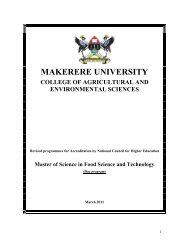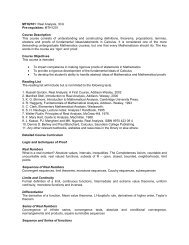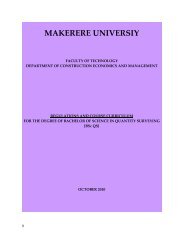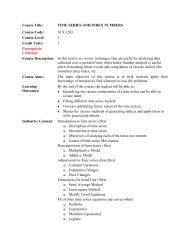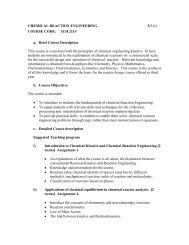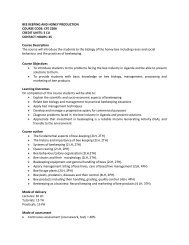MAKERERE UNIVERSITY - Office of the Academic Registrar ...
MAKERERE UNIVERSITY - Office of the Academic Registrar ...
MAKERERE UNIVERSITY - Office of the Academic Registrar ...
Create successful ePaper yourself
Turn your PDF publications into a flip-book with our unique Google optimized e-Paper software.
<strong>MAKERERE</strong><strong>UNIVERSITY</strong>SCHOOL OF EDUCATIONMASTER OF EDUCATION INLANGUAGE AND LITERATUREEDUCATIONM.ED.LLE20101
1.0 BackgroundThe Department <strong>of</strong> Language Education (DLE) was established in 1993 after <strong>the</strong> subject unit wasseparated from <strong>the</strong> Department <strong>of</strong> Social Science and Arts Education (DOSSAE). The aim <strong>of</strong> <strong>the</strong>separation was to ensure <strong>the</strong> specialised preparation and continuous pr<strong>of</strong>essional development <strong>of</strong>language teachers and o<strong>the</strong>r language education pr<strong>of</strong>essionals. An attendant aim was to respondto <strong>the</strong> growing numbers <strong>of</strong> university entrants interested in <strong>the</strong> language teaching pr<strong>of</strong>ession, thusrecruiting more language specialists than was previously possible in <strong>the</strong> DOSSAE arrangement.With <strong>the</strong>se provisions <strong>the</strong> School <strong>of</strong> Education has been able not only to admit increasingnumbers <strong>of</strong> applicants for <strong>the</strong> language teaching courses on <strong>the</strong> B.A. Education and M.Ed.Language Education programmes but also to broaden <strong>the</strong> range <strong>of</strong> languages <strong>of</strong>fered. From <strong>the</strong>limited catering for 5 M.Ed. students, all doing English, in 1988, <strong>the</strong> department now providesfor M.Ed. in language and literature with Luganda, French, German, Kiswahili and Arabic inaddition. The M.Ed. LLE programme <strong>the</strong>refore is designed for language teaching pr<strong>of</strong>essionalswho wish to master <strong>the</strong> requisite knowledge and skills <strong>of</strong> planning, teaching, assessing andevaluating language and literature programmes in educational institutions and any relatedorganisations. It is good also for those who wish to engage in policy formulation and researchand development activity in this field.In <strong>the</strong> past, graduates <strong>of</strong> <strong>the</strong> M.Ed. LLE programme have gone on to teach in schools or to o<strong>the</strong>rjobs that require knowledge and use <strong>of</strong> language. Masters graduates have filled positions inschools, teachers‟ colleges, curriculum development institutions, assessment bodies, educationministry departments in Uganda and abroad, media organisations, education publishing housesand development and humanitarian organisations.2.0 JustificationObservation <strong>of</strong> teachers and analysis <strong>of</strong> <strong>the</strong> literature <strong>of</strong> language teaching research both revealcritical gaps in pr<strong>of</strong>essional competence in spite <strong>of</strong> <strong>the</strong> clear need for it. While great numbers <strong>of</strong>university and college graduates possess knowledge about <strong>the</strong> structures <strong>of</strong> <strong>the</strong> languages <strong>the</strong>yhave studied, accounting partially for content knowledge (CK), many who go on to teach it donot necessarily demonstrate <strong>the</strong> ability to draw on <strong>the</strong> language <strong>the</strong>ories for effective pedagogy(P). This is in spite <strong>of</strong> <strong>the</strong> training investments made in <strong>the</strong> tertiary institutions and <strong>the</strong> growth <strong>of</strong><strong>the</strong> language teaching industry, which is evident in <strong>the</strong> establishment <strong>of</strong> new school and collegecurricula and/or <strong>the</strong> revision <strong>of</strong> old ones, besides <strong>the</strong> growing number <strong>of</strong> clients. In Uganda, asin many o<strong>the</strong>r contexts, this is <strong>of</strong>ten as a result, on <strong>the</strong> one hand, <strong>of</strong> <strong>the</strong> demand for grades byboth schools and parents. On <strong>the</strong> o<strong>the</strong>r hand, it results from teachers‟, language education policymakers‟, curriculum and assessment specialists‟ as well as instructional materials writers‟ partialunderstanding <strong>of</strong> <strong>the</strong> demands <strong>of</strong> language teaching and learning.This lack <strong>of</strong> capacity among <strong>the</strong> supposed educational leaders reflects in <strong>the</strong> poor performance <strong>of</strong>learners, which is essentially <strong>the</strong> assessment <strong>of</strong> those who plan for and implement <strong>the</strong> teaching.Altoge<strong>the</strong>r, <strong>the</strong> limitations exist in a vicious cycle <strong>of</strong> causes and consequences: <strong>the</strong> practitionerslack <strong>the</strong> confidence that is critical for making decisions for pedagogy, resulting in poor practice;poor performance undermines confidence in practitioners‟ knowledge and skills. Practitioners‟lack <strong>of</strong> confidence is at <strong>the</strong> core <strong>of</strong> inadequate pr<strong>of</strong>essional capacity.2
The wide gap between <strong>the</strong> knowledge <strong>of</strong> <strong>the</strong>ory and <strong>the</strong> practice <strong>of</strong> language teaching represents,in general, <strong>the</strong> practitioners‟ low pr<strong>of</strong>iciency levels in pedagogical content knowledge (PCK).Higher levels <strong>of</strong> PCK would facilitate an effective bridging <strong>of</strong> <strong>the</strong> gaps in pedagogy. There is<strong>the</strong>refore a great need for a higher caliber <strong>of</strong> practitioners who can boast <strong>of</strong> pr<strong>of</strong>essional capacityin language teaching. To meet this, <strong>the</strong>re is a requirement for graduate training that exposesbeneficiaries to issues greater than and well beyond teaching language syllabuses in <strong>the</strong>classroom.Goal and ObjectivesThe overall goal <strong>of</strong> <strong>the</strong> MED.LLE programme is to prepare language education pr<strong>of</strong>essionalswho will take up responsibility for language policy and its implementation and development.The programme will produce graduates who, at whatever level in <strong>the</strong> education system andwherever in <strong>the</strong> world <strong>the</strong>y may go to work, will demonstrate mastery <strong>of</strong> <strong>the</strong> four desiredteaching components – Content Knowledge, Pedagogical Content Knowledge, Pedagogy and,indeed, Pr<strong>of</strong>essionalism. The graduates will be capable to work as(i)(ii)(iii)(iv)(v)(vi)language policy specialists in relevant government departments who will deliberateon <strong>the</strong> place <strong>of</strong> language in national, school and o<strong>the</strong>r public functions;curriculum specialists responsible for curriculum development and reform;materials developers who are equipped with a capacity for internalizing <strong>the</strong> <strong>the</strong>ories<strong>of</strong> language learning and use, determining <strong>the</strong> teaching and learning needs <strong>of</strong> variousclientele, selecting teaching and learning content and designing materials for use inspecified language and literature programmes;educational researchers who are capable <strong>of</strong> interpreting situations and developmentsfor <strong>the</strong> benefit <strong>of</strong> language teaching and learning;teacher educators at colleges and universities, capable <strong>of</strong> equipping teacher traineesnot only with knowledge about languages <strong>of</strong> interest but also with <strong>the</strong> confidence tomake decisions suitable to learning contexts, andSchool teachers who are capable <strong>of</strong> teaching learners not only to know about <strong>the</strong>languages but also to use <strong>the</strong>m in real communication situations.4. OutcomesThe programme is designed to produce a human resource that is obviously greatly lacking in <strong>the</strong>field <strong>of</strong> language education. This human resource is, in total, desired to make an impact in <strong>the</strong>development <strong>of</strong> language education policy and implementation by influencing debate anddecisions for designing curricula and specific level as well as grade syllabuses, assessmentpractices, classroom teaching and instructional materials design and development. Theprogramme <strong>the</strong>refore is to prepare teachers/educators with adequate knowledge, skills andcommand <strong>of</strong> issues necessary for designing, implementing, teaching, supervising and evaluatingcurricula and Programmes. Specifically <strong>the</strong> programme aims at enriching graduates in <strong>the</strong>following.1. Lecturers <strong>of</strong> content and methods in tertiary institutions including Universitiesand teacher education institutions.2. Handling Department and school head teachers to be able to handle LanguageEducation adequately3
3. To equip Inspectors or subject related administrators or supervisors in <strong>the</strong>ministry responsible for education, in <strong>the</strong> districts and with NGO‟s providingeducation services.4. Subject specialists in <strong>the</strong> National Curriculum Development Centre andinstitutions with similar functions.5. Subject specialists with <strong>the</strong> Uganda National Examination Board or o<strong>the</strong>rexamination boards with similar functions.5.0 ApproachAll learners on <strong>the</strong> programme will be taught some units toge<strong>the</strong>r in a <strong>the</strong>oretical approach tolanguage education. Equipped with <strong>the</strong> <strong>the</strong>oretical knowledge <strong>the</strong> learners will <strong>the</strong>n separate intospecific language groups – English, Kiswahili, Luganda, French, German, Arabic - to engage inpractical sessions dedicated to teaching and research in <strong>the</strong>se areas.6.0 ResourcesThere are adequate basic and supplementary resources to support <strong>the</strong> MED.LLE programme.These are outlined here below.6.1 StaffingCurrently <strong>the</strong>re is 1 Pr<strong>of</strong>essor and 2 Senior Lecturers and 2 Lecturers with Ph.D. These willteach <strong>the</strong> programme with <strong>the</strong> support <strong>of</strong> senior staff from o<strong>the</strong>r faculties in Senate‟srecommended arrangement <strong>of</strong> joint teaching (List <strong>of</strong> Staff is attached).6.2 FacilitiesThe educational facilities required on this programme are adequately available in <strong>the</strong> School <strong>of</strong>Education and o<strong>the</strong>r locations in <strong>the</strong> university. Particularly, print and electronic mediaresources are available in <strong>the</strong> Language Teaching Resource Centre (LTRC), which also houses<strong>the</strong> DLE Book Bank, <strong>the</strong> School <strong>of</strong> Education Book Bank and <strong>the</strong> University Main Library.6.3 SpaceSpace is available for <strong>the</strong> programme within <strong>the</strong> LTRC and o<strong>the</strong>r lecture rooms as well as courselecturers‟ <strong>of</strong>fices.7.0 FundingThe M.Ed. Language and Literature Education will be self-sustaining. All fees payable by <strong>the</strong>students will be determined by <strong>the</strong> University Council.6.0 General RegulationsAll <strong>the</strong> application, admission, examinations and graduation regulations common to <strong>the</strong> Mastersprogrammes <strong>of</strong> Makerere University shall apply to <strong>the</strong> M.Ed. Language and Literature Educationdegree programme.7.0 Admission RequirementsApplicants who qualify for admission will possess an honours degree in education, with aspecialisation in language and literature teaching or, demonstrate an upgrading <strong>of</strong> <strong>the</strong>irqualification in additional certification at, say diploma or certificate level.4
8.0 Programme DurationThe M.Ed. Language and Literature Education is a full time undertaking. It will run for twoacademic years in four semesters <strong>of</strong> 17 weeks each. 15 weeks in each <strong>of</strong> <strong>the</strong> first two semesterswill be devoted to class course work and two weeks to semester examinations. The recess termfor proposal writing and defending, The first semesters <strong>of</strong> Year II (third semester) will bedevoted to research and dissertation writing, while <strong>the</strong> fourth semester shall be for dissertationdefense, corrections and submission <strong>of</strong> approved corrected dissertation.8.1 Programme StructureCourses in <strong>the</strong> program are structured in such a way thata) During <strong>the</strong> first year, M.Ed. LLE students shall do core Education courses <strong>of</strong>fered by <strong>the</strong>School <strong>of</strong> Education with two core courses on <strong>the</strong> LLE Programme. They will also selecttwo elective courses in <strong>the</strong>ir areas <strong>of</strong> specialisation.b) Methodology in <strong>the</strong> areas <strong>of</strong> <strong>the</strong> program shall be done at <strong>the</strong> department <strong>of</strong> LanguageEducation while specific selected content courses shall be done in conjunction witho<strong>the</strong>rs service units namely Institute <strong>of</strong> Languages and Department <strong>of</strong> Literature inFaculty <strong>of</strong> Arts.c) Seminar Series shall be in Second Semester and shall be considered and assessed ascourse work. The departments shall draw programmes that will constitute semester seriesfor each semester and <strong>the</strong>se shall be assessed during <strong>the</strong> semester.d) A Research proposal shall be written during <strong>the</strong> recess term and will carry 20% <strong>of</strong> <strong>the</strong>mark for <strong>the</strong> research and dissertation.e) A student will carry out research during <strong>the</strong> first semester <strong>of</strong> <strong>the</strong> second year <strong>of</strong>registration (third semester) and defend his/her dissertation in a viva voce before aselected panel <strong>of</strong> examiners before <strong>the</strong> end <strong>of</strong> <strong>the</strong> fourth semester or end <strong>of</strong> second year <strong>of</strong>registration. The length <strong>of</strong> <strong>the</strong> dissertation shall be between 10,000 – 12,000 words (Seegraduate studies regulations regarding dissertation).8.2 Grading(a) Each course shall be graded on a maximum <strong>of</strong> 100 marks. Assessment results will berecorded as marks matched by letter grades and grade points. The grading will be done asfollows.The distribution <strong>of</strong> marks between course work and written examinations will be in accordancewith guidelines set by <strong>the</strong> University. It shall be as follows:All scores are converted to letter grades using <strong>the</strong> following system:Marks% Letter Grade Grade Point Interprétation90-100 A+ 5 Exceptional80-89 A 5 Excellent75-79 B+ 4.5 Very good70-74 B 4 Good65-69 C+ 3.5 Fairly good60-64 C 3 Pass5
55-59 D+ 2.5 Marginal fail50-54 D 2 Clear fail45-49 E 1.5 Bad fail40-44 E- 1 Qualified failBelow 40 F 0 Qualified fail(b) The pass grade point per course is 3.0.(c) The following letter signs will be used where relevant.W Withdrawn from courseI Incomplete resultsAUD Audited course only(d) No credit unit shall be awarded for any course in which a student fails <strong>the</strong> exam.(e) Research and Dissertation shall carry 10CU. 2CU will be for proposal writing and 8CU forapproved dissertation.8.3 Progress on <strong>the</strong> ProgrammeProgression through <strong>the</strong> course shall be assessed in three categories as follows.(i) Normal Progress, for when a student passes all courses;(ii) Probationary Progress, which is a warning, for whena) a student fails a core course, orb) a student obtains a Grade Point Average (GPA) or Cumulative Grade Point Average(CGPA) <strong>of</strong> less than 3.0Probation ceases when ei<strong>the</strong>r <strong>of</strong> <strong>the</strong> above conditions (a) and (b) no longer holds.(iii) Discontinuation, when one <strong>of</strong> <strong>the</strong> following conditions obtains:a) Receiving two probations on <strong>the</strong> same core course, orb) Obtaining two consecutive probations based on GPA or CGPA.(iv) During Research period, a report on <strong>the</strong> progress <strong>of</strong> <strong>the</strong> student shall be given by <strong>the</strong>supervisor quarterly.8.4 Retaking a CourseThere shall be no supplementary examination in any course <strong>of</strong> <strong>the</strong> programme. However, astudent may retake a course when it is <strong>of</strong>fered again in order to:a) pass it if <strong>the</strong> student had failed it before, orb) improve <strong>the</strong> grade if <strong>the</strong> previous pass grade was low.A student who does not wish to retake a failed elective course shall be allowed to take on asubstitute elective.8.5 Award <strong>of</strong> <strong>the</strong> M.Ed. Language Education DegreeThe degree <strong>of</strong> M.Ed. Language Education shall be awarded to a candidate who has passed allprescribed courses and successfully completed <strong>the</strong> dissertation.6
9.0 Summary <strong>of</strong> CoursesFollowing is <strong>the</strong> summary <strong>of</strong> all courses <strong>of</strong>fered on <strong>the</strong> M.Ed. Language Education Programme,some core and o<strong>the</strong>rs elective.Year One – Semester OneCourse Course TitleLH PH CH CUCodeEDU 7101 Qualitative Research Methods 15 60 45 2EDU 7102 Quantitative Research Methods 15 60 45 2CUS 7102 Contemporary Curricular Issues in Education 15 30 30 2LLE 7101 Theory and Practice <strong>of</strong> Language and Literature 30 60 60 4PedagogyElective Select two to follow in <strong>the</strong> area <strong>of</strong> specialization, e.g.English, Luganda, French, German, Kiswahili,ArabicEnglish Language EducationLLE 7102 School and College Reading and Writing Programmes 30 60 60 3LIT 7107 1 Oral Literature 30 60 60 3LLE 7104 Language Teacher Education and Development 30 60 60 3LLE 7103 Classroom Cultures and Language Pedagogy 30 60 60 3LLE 7105 2 Analysis and Interpretation <strong>of</strong> Texts 30 60 60 3LLE 7106 Language Course Design, Management and Evaluation 30 60 60 3CUS 7105 Curriculum Design and Development 30 60 60 3Luganda Language EducationLLE 7104 Language Teacher Education and Development 30 60 60 3LLE 7103 Classroom Cultures and Language Pedagogy 30 60 60 3LLE 7105 3 Analysis and Interpretation <strong>of</strong> Texts 30 60 60 3LLE 7106 Language Course Design, Management and Evaluation 30 60 60 3CUS 7105 Curriculum Design and Development 30 60 60 3ALM 7106 Materials Development and production in African 30 60 60 3LanguagesGerman Language EducationLLE 7104 Language Teacher Education and Development 30 60 60 3LLE 7103 Classroom Cultures and Language Pedagogy 30 60 60 3LLE 7105 4 Analysis and Interpretation <strong>of</strong> Texts 30 60 60 3LLE 7106 Language Course Design, Management and Evaluation 30 60 60 3CUS 7105 Curriculum Design and Development 30 60 60 3LIT 7106 Popular Literature 30 60 60 3French Language EducationLLE 7104 Language Teacher Education and Development 30 60 60 3LLE 7103 Classroom Cultures and Language Pedagogy 30 60 60 31 Taught at Department <strong>of</strong> Literature & Institute <strong>of</strong> Languages, Faculty <strong>of</strong> Arts2 Taught in Conjunction with Department <strong>of</strong> Literature & Institute <strong>of</strong> Languages, Faculty <strong>of</strong> Arts3 Taught in Conjunction with Department <strong>of</strong> Literature & Institute <strong>of</strong> Languages, Faculty <strong>of</strong> Arts4 Taught in Conjunction with Department <strong>of</strong> Literature & Institute <strong>of</strong> Languages, Faculty <strong>of</strong> Arts7
LLE 7105 5 Analysis and Interpretation <strong>of</strong> Texts 30 60 60 3LLE 7106 Language Course Design, Management and Evaluation 30 60 60 3CUS 7105 Curriculum Design and Development 30 60 60 3LIT 7105 Theatre for Development 30 60 60 3Arabic Language EducationLLE 7104 Language Teacher Education and Development 30 60 60 3LLE 7103 Classroom Cultures and Language Pedagogy 30 60 60 3LLE 7105 6 Analysis and Interpretation <strong>of</strong> Texts 30 60 60 3LLE 7106 Language Course Design, Management and Evaluation 30 60 60 3CUS 7105 Curriculum Design and Development 30 60 60 3ALM 7107 Policy Development for African Languages 30 60 60 3Total CU 16Year One – Semester TwoCourse Course TitleLH PH CH CUCodeEDF 7201 Advanced Studies in Educational Foundations 30 60 60 3LLE 7201 Assessing Language and Literary Competences 30 60 60 3LLE 7202 Language and Literature Resource Development and 15 30 30 2ManagementEDU 7201 Seminar Series 15 30 30 2Elective Select two to follow in <strong>the</strong> area <strong>of</strong> specializationEnglish Language EducationLLE 7203 Supervision and Inspection <strong>of</strong> Language and Literature 30 60 60 3Teaching ProgrammesLLE 7204 7 Teaching Speaking and Listening Skills to Adult 30 60 60 3LearnersLLE 7205 Developing Language and Literature Courses for Young 30 60 60 3LearnersLLE 7206 Integrating Oral Literature in School Curricula 30 60 60 3LIT 7206 Literature and Human Rights 30 60 60 3Luganda Language EducationLLE 7203 Supervision and Inspection <strong>of</strong> Language and Literature 30 60 60 3Teaching ProgrammesLLE 7204 8 Teaching Speaking and Listening Skills to Adult 30 60 60 3LearnersLLE 7205 Developing Language and Literature Courses for Young 30 60 60 3LearnersLLE 7206 Integrating Oral Literature in School Curricula 30 60 60 3LIT 7208 Gender Issues in Literature and <strong>the</strong> Media 30 60 60 35 Taught in Conjunction with Department <strong>of</strong> Literature & Institute <strong>of</strong> Languages, Faculty <strong>of</strong> Arts6 Taught in Conjunction with Department <strong>of</strong> Literature & Institute <strong>of</strong> Languages, Faculty <strong>of</strong> Arts7 Taught in Conjunction with Department <strong>of</strong> Literature & Institute <strong>of</strong> Languages, Faculty <strong>of</strong> Arts8 Taught in Conjunction with Department <strong>of</strong> Literature & Institute <strong>of</strong> Languages, Faculty <strong>of</strong> Arts8
German Language EducationLLE 7203 Supervision and Inspection <strong>of</strong> Language and Literature 30 60 60 3Teaching ProgrammesLLE 7204 9 Teaching Speaking and Listening Skills to Adult 30 60 60 3LearnersLIT 7204 Trends in 20 th Century Drama 30 60 60 3LLE 7205 Developing Language and Literature Courses for Young 30 60 60 3LearnersLLE 7206 Integrating Oral Literature in School Curricula 30 60 60 3French Language EducationLLE 7203 Supervision and Inspection <strong>of</strong> Language and Literature 30 60 60 3Teaching ProgrammesLLE 7204 10 Teaching Speaking and Listening Skills to Adult 30 60 60 3LearnersLLE 7205 Developing Language and Literature Courses for Young 30 60 60 3LearnersLLE 7206 Integrating Oral Literature in School Curricula 30 60 60 3LIT 7207 Caribbean Literature 30 60 60 3Arabic Language EducationLLE 7203 Supervision and Inspection <strong>of</strong> Language and Literature 30 60 60 3Teaching ProgrammesLLE 7204 11 Teaching Speaking and Listening Skills to Adult 30 60 60 3LearnersLLE 7205 Developing Language and Literature Courses for Young 30 60 60 3LearnersLLE 7206 Integrating Oral Literature in School Curricula 30 60 60 3ALM 7206 African Languages and <strong>the</strong> Media 30 60 60 3Total CU 16Year Two Semester 3 and 4EDU 7301 Research Proposal 60 30 2EDU 7302 Research and Dissertation 240 120 8Total CU 109 Taught in Conjunction with Department <strong>of</strong> Literature & Institute <strong>of</strong> Languages, Faculty <strong>of</strong> Arts10 Taught in Conjunction with Department <strong>of</strong> Literature & Institute <strong>of</strong> Languages, Faculty <strong>of</strong> Arts11 Taught in Conjunction with Department <strong>of</strong> Literature & Institute <strong>of</strong> Languages, Faculty <strong>of</strong> Arts9
DETAILED COURSE OUTLINESEDU 7101 QUALITATIVE RESEARCH (Core for All MED students at SoE)COURSE DESCRIPTIONThrough interactive lectures, discussions and hands – on experiences, this course enablesstudents to get acquitted with <strong>the</strong> philosophy, assumptions and principles in <strong>the</strong> qualitativeparadigm. The students are introduced to different ways <strong>of</strong> knowing, understanding <strong>of</strong> multiplerealities and <strong>the</strong> appreciation that reality is a social construction. The course also gives studentsan opportunity to creatively work with diverse data types and produce coherent and relevantexplanations and interpretations using different <strong>the</strong>oretical stances.COURSE OBJECTIVEESSpecifically <strong>the</strong> course is designed to enable students to;a) Identify an appropriate research strategy for <strong>the</strong>ir research problem.b) Critically review and make use <strong>of</strong> relevant literature to inform <strong>the</strong>ir study.c) Construct and utilize appropriate data collection techniques for <strong>the</strong>ir research.d) Critically examine <strong>the</strong>ir personal perceptions and <strong>the</strong>ir implications to <strong>the</strong> research processe) Gain skills and knowledge in generating codes, writing memos, and using <strong>the</strong>m to makeexplanations and descriptionsf) Write reportsCOURSE ASSESSMENTThe paper will be marked out <strong>of</strong> 100%Coursework (test, assignments and class participation) 40%Examination 60%The pass mark will be 60%Course work will comprise <strong>of</strong> two mini projects that <strong>the</strong> students will identify to give <strong>the</strong>m morepractical skills in <strong>the</strong> design and use <strong>of</strong> research techniques covered in <strong>the</strong> course. Each coursework will be 20 marks.COURSE CONTENTSECTION A: Introduction1. Introduction to Qualitative researcha. Definitions and assumptionsb. Nature <strong>of</strong> qualitative researchc. Research design2. Types <strong>of</strong> Qualitative Research in Educationa. Ethnography; b. Case studies c. Historical studies d. Action research3. Literature Reviewa. process <strong>of</strong> reviewing <strong>of</strong> literature in Education Studiesb. Uses <strong>of</strong> a literature review10
i. Clarifying conceptsii. Identifying research gapsiii. Generate <strong>the</strong>ory4. Theoretical/conceptual frameworka. Role <strong>of</strong> <strong>the</strong>ory in qualitative researchb. Sources <strong>the</strong>ory (experiential knowledge, existing <strong>the</strong>ory/literature, pilot /exploratory study)5. Data collection methods (construction and use <strong>of</strong> data collection tools/instruments)i. interviewsii. Focus Group Discussionsiii. Observations1. Participant observations2. Non participant observations3. Classroom observationsiv. Document analysis6. Issue in data collectiona. Ethics, Confidentiality, Accessb. Researchers role (subjective and objective debates)c. Validity and reliability checks7. Proposal Writing and Education ResearchSECTION B: Data Analysis1. Capturing data (interviews, document, photographs)2. Data Analysisi. Codes and coding, Memo, Case analysisii. Exploring and describingiii. Explaining & predicting3. Working with different transcripts4. Computer package for data analysis in teaching and research(e.g NVIVO)5. Report writinga. Interpretation <strong>of</strong> data and integrating <strong>of</strong> findings with existing knowledge(discussion)b. Comparing, contrasting, speculationc. Theoretical consolidation and applicationd. Use <strong>of</strong> metaphor & Analogiese. Making relevant conclusionsf. Report format and structuresREADING LIST1. Denzin, N. and Lincolin, Y. (1994). Handbook <strong>of</strong> qualitative research. London. SagePublications11
2. LeCompte, M & Preissle, J. (1984). Ethnography and qualitative design in educationalresearch. Orlando: <strong>Academic</strong> press.3. Marshall, C. & Rossman, G. (2006). Designing qualitative research. London: Sagepublications4. Mason, J. (1996). Qualitative researching. London. Sage publications5. Maxwell, Joseph (1993). Qualitative research design. London. Sage Publication6. Maxwell. J. (1996).Qualitative research design: An interactive approach. LondonSage publications.7. Miles, M. & Huberman, M (1994). Qualitative data analysis, London. SagePublications8. Miles, M. & Huberman, M. (1994). Qualitative data analysis: An expanded sourcebook.London. Sage Publications9. Preissle, J. & Lecompte, M. (1993). Ethnography and qualitative design in educationalresearch 2 ed. San Diego: <strong>Academic</strong> press.10. Ryan, Anne B. (2006) Methodology: Analysing Qualitative Data and Writing up yourFindings. In: Researching and Writing your <strong>the</strong>sis: a guide for postgraduate students.Mace: Maynooth Adult and Community Education, pp. 92-108.11. Silverman, David (1993). Interpreting Qualitative data: methods for analyzing; talk, textand interaction. London. Sage Publication12. Strauss, A & Corbin, J.(1998) Basics <strong>of</strong> Qualitative Research: Techniques andProcedures. London. Sage publications13. Tesch, R. (1990). Qualitative Research: Analysis types and s<strong>of</strong>tware tools. London. TheFalmer Press14. Yin, R. (2003) Case study research: Design and methods. London sageEDU 7102 QUANTITATIVE RESEARCH METHODS(Core for All MED students at SoE)Course DescriptionThis course enables students to get acquainted with <strong>the</strong> philosophy, assumptions and principlesin <strong>the</strong> quantitative paradigm. In addition, <strong>the</strong>y are exposed to key steps in planning andimplementation <strong>of</strong> quantitative research. The students are introduced to planning for research,descriptive and inferential statistics, and aspects <strong>of</strong> report writing.Course ObjectivesBy <strong>the</strong> end <strong>of</strong> <strong>the</strong> course, students should be able to;1. Differentiate quantitative research from qualitative research2. Write a research proposal3. Discuss <strong>the</strong> role <strong>of</strong> basic statistics in quantitative research4. Apply statistics in <strong>the</strong> processing <strong>of</strong> quantitative data (data analysis and interpretation)5. Manipulate <strong>the</strong> various variables in quantitative research12
Course OutlineIntroduction“What is research”; “What is Quantitative research”; “Differences between Qualitative andQuantitative research”; “Importance <strong>of</strong> Quantitative research”.Planning Research in Education“Key steps in planning: developing ideas, identifying <strong>the</strong> problem, and clarifying <strong>the</strong>purpose and objectives” “Ethical consent”Sources <strong>of</strong> information and techniques <strong>of</strong> ga<strong>the</strong>ring relevant information “Sources: Primaryand secondary sources <strong>of</strong> information; e-sources and non-e sources; Journals; Dissertations;Museums; GIS; Remote sensing” etc.Developing a research proposal “Components: The title, background; problem statement,purpose, objectives, <strong>the</strong>ory and research, scope, significance/justification; conceptualframework, critical literature review, hypo<strong>the</strong>sis formulation and research questions,methods: design, population and sampling; review <strong>of</strong> various research methods and tools;validity and reliability <strong>of</strong> tools in quantitative research; data collection procedure; andanalysis”Introduction to Statistics“What is Statistics?” “Types <strong>of</strong> applied Statistics”; “Descriptive Statistics”; “InferentialStatistics”; “Role <strong>of</strong> Statistics in education research”Role <strong>of</strong> Statistics in research planningRole <strong>of</strong> Statistics in data processing and analysis“Descriptive Statistics” and “Inferential Statistics”Statistics and report writingData Processing “What is data processing”; Why data processing” “Different ways <strong>of</strong> dataprocessing”; Data editing or cleaning; Data categorizing or coding; Data entry “Computersand data entry and editing”; “Data transformation”; “Organizing data” Data presentation;“Presenting data”; “Tabulation”; “Graphs”Variables - What are variables? Why variables?Types <strong>of</strong> variables - “Types <strong>of</strong> Research variables” ; Coombs: “Categorical variables”;“Numerical variables”; Relationship between categorical and numerical variables” Accordingto <strong>the</strong>ir role in research: “Dependent variable”; “Independent variable”; “Extraneousvariable”; “Moderator variable” Types <strong>of</strong> analysis according to number <strong>of</strong> variablesDescriptive Data AnalysisIntroduction” What is descriptive data analysis?”; Analysis <strong>of</strong> frequencies or frequencycounts; “Relative frequency”; “Relative percentage frequency distribution”; 5.3Analysis <strong>of</strong> central tendency or location; “Measures <strong>of</strong> central tendency”; Analysis <strong>of</strong>dispersion; “Measures <strong>of</strong> dispersion”; 5 Analysis <strong>of</strong> skew; “Plotting distributions”; “Shapes<strong>of</strong> distributions”; “Relationship among mean, mode and median”Introduction to Inferential Data Analysis - “What is inferential data analysis?” Inferentialversus descriptive data analysis; “Descriptive Statistics”; “Inferential Statistics” ;Terminology in inferential data analysis; “Population and sample”; “Sampling”;“Inferences”; Estimation <strong>of</strong> parameters; “Point and interval estimates” Test <strong>of</strong> hypo<strong>the</strong>ses;“Concepts in hypo<strong>the</strong>sis testing: What is a hypo<strong>the</strong>sis?” “Why hypo<strong>the</strong>sis”13
Comparative Data Analysis - “Rationale for comparative data analysis” Comparison <strong>of</strong> twopopulation means for equality: Two-sample t-test - “Student t test for independent samples:Comparing two population means” in part; “Characteristics <strong>of</strong> <strong>the</strong> sampling distribution <strong>of</strong><strong>the</strong> difference between means” Comparison <strong>of</strong> two or more population means for equality:Analysis <strong>of</strong> Variance (ANOVA)“Single-factor independent measures design (One-way)”; “Hypo<strong>the</strong>ses for single-factorindependent measures ANOVA”; “Partitioning sums <strong>of</strong> squares” “Formulae for sums <strong>of</strong>squares, degrees <strong>of</strong> freedom, mean squares and F-ratio”Correlative Data Analysis - “Importance <strong>of</strong> correlative data analysis”; Co-relation betweentwo numerical or continuous variables: Pearson‟s Correlation Co-efficient “Scatterdiagrams”; “Characteristics <strong>of</strong> a relationship”; “Pearson‟s Product-Moment CorrelationIndex”; “Interpreting Pearson‟s Product-Moment Correlation Index”; “Testing hypo<strong>the</strong>seswith Pearson Correlation” ; Co-relation between two ordinal or ranked variables:Spearman‟s Correlation Co-efficient; “Spearman‟s Correlation”; “O<strong>the</strong>r measures <strong>of</strong>relationship” in part under Spearman‟s Correlation” ; Co-relation between two categoricalvariables: Chi-square; “Chi-square goodness-<strong>of</strong>-fit”; “Chi-square test for independence <strong>of</strong>two variables”; “Chi-square test <strong>of</strong> independence for dichotomous variables”; “Assumption<strong>of</strong> Chi-square test <strong>of</strong> independence”Data Presentation, Analysis & Interpretation - Background <strong>of</strong> respondents; Addressingresearch objectives, questions and/ or hypo<strong>the</strong>ses; “Data presentation, analysis andinterpretation” ; Discussion, Conclusions & Recommendations. Writing references (APA ando<strong>the</strong>r formats)EvaluationThe paper will be marked out <strong>of</strong> 100%Coursework 40%Examination 60%Course work will comprise projects in <strong>the</strong> design and use <strong>of</strong> research techniques covered in <strong>the</strong>course.ReferencesAmin, M. E. (2005). Social science research: Conception, methodology and analysis. Kampala:Makerere University Printery.Amin, M. E. (2004). Foundation <strong>of</strong> statistical inference for social science research. Kampala:Makerere University Printery.Bakkabulindi, F. E. K. (2008). Individual characteristics affecting use <strong>of</strong> computers in MakerereUniversity. Proposal written as prototype for training Masters students. E.A. Inst. forHigher Educ. Studies & Dev., School <strong>of</strong> Educ., Makerere University, Kampala, Uganda.Bakkabulindi, F. E. K. (2004). Research methods by example. Unpublished manuscript.Bakkabulindi, F. E. K. (1999). Statistics by example. Unpublished manuscript.Bowen, B. D. & Werberg, H. F. (1980). Introduction to data analysis. San Francisco: W. H.Freeman & Co.14
LLE 7101: THEORY AND PRACTICES OF LANGUAGE AND LITERATUREPEDAGOGY (Core for MED LLE Students)Course DescriptionThis course is designed for <strong>the</strong> study <strong>of</strong> contemporary <strong>the</strong>ory and grounded knowledge <strong>of</strong>practices in <strong>the</strong> teaching <strong>of</strong> language and literature. It is aimed at ensuring learners‟understanding <strong>of</strong> (i) <strong>the</strong> knowledge underpinning teaching methodologies and (ii) <strong>the</strong> value <strong>of</strong>selected methodology. The course involves both <strong>the</strong>oretical and practical sessions, <strong>the</strong> latterrequiring students to conduct classes to demonstrate choices <strong>of</strong> methodology based on selected<strong>the</strong>ories and guided by context.Learning OutcomesLearners will be able to:(i) analyse <strong>the</strong>oretical considerations that influence teachers‟ methods anywhere;(ii) critique common and o<strong>the</strong>r arguments for and against various methodologies;(iii) apply <strong>the</strong>ir understanding <strong>of</strong> <strong>the</strong> strengths <strong>of</strong> effective methodologies in language andliterature classrooms, and(iv) demonstrate a sound mix <strong>of</strong> methodologies for effective teaching.ObjectivesThe course is designed to equip learners with:(i) knowledge <strong>of</strong> a range <strong>of</strong> existing methodologies;(ii) skills for using various methodologies to teach literature and language;(iii) competence for assessing teachers‟ selection and classroom application <strong>of</strong>methodologies, and(iv) competence for developing in o<strong>the</strong>rs <strong>the</strong> skills <strong>of</strong> teaching literature and languageeffectively.ContentLearners will be exposed to <strong>the</strong> philosophical underpinnings <strong>of</strong> teacher-centred, learner centredand learning-centred methods. They will critique a range <strong>of</strong> language teaching approaches aswell as teaching methods and techniques and describe <strong>the</strong>ir value for language and literatureclassrooms. Course activities will include plenary discussion and practice teaching in primary,secondary and tertiary classrooms besidesTeaching MethodsLecture; Small group; Seminar; Demonstration15
Course OutlineWeek Content/Activity1 & 2 Theoretical IssuesConstructivist view <strong>of</strong> learningConceptual change in language educationDesigning language course objectivesFunctional-Notional approachesSituational approachesCommunicative approaches3 & 4 Comparison <strong>of</strong> Language Teaching Methods andTechniquesTeacher-centred and learner-centred methodsGrammar Translation MethodTotal Physical ResponseCommunicative MethodsCooperative learning, collaborative learning techniques5 & 6 Language in EducationLanguage policies and language education in AfricancountriesLanguages <strong>of</strong> education in AfricaTransiting from home to school languagesBantu languages as LOIs in primary schoolMethodology <strong>of</strong> second language teaching in secondaryschoolTeaching Kiswahili at <strong>the</strong> primary school and teacherscollegeMethodology <strong>of</strong> foreign language teaching7 & 8 Contemporary IssuesLanguage in <strong>the</strong> universalisation <strong>of</strong> EducationEarly literacy developmentTeaching language in large primary, secondary and tertiaryclassesMixed ability groupingGender in language teaching9 & 10 Language and Literature Materials Selection and UseTarget content, language attainment level, presentationMaterial as source <strong>of</strong> language contentMaterial as learning propSame content different material v. same materialdifferent content11 Language Policy Implementation – Speaking and WritingModelsEnglish modelsKiswahili models16
French modelsGerman models12 Organising and Evaluating Learning TasksInput hypo<strong>the</strong>sisLearner engagementTeacher feedbackLearner independence, cooperative learning,collaborative learning techniquesLanguage use in <strong>the</strong> classroom13, 14 &15Peer Teaching, Teaching at Demonstration and CollegeSchools16 & 17 ExaminationsMaterialsBishop, G. (1985) Curriculum Development, London: Macmillan Publishers Ltd.Brindley, S. (Ed.) (1994) Teaching English in <strong>the</strong> Secondary School, London: Routledge andOpen University.Brumfif, C.J. & Roberts, J.T. (1983) Language and Language Teaching, London: Batsford<strong>Academic</strong> and Educational Ltd.Clarke, S., P.Dickinson & J. Westbrook (Ed.) (2010) The Complete Guide to Becoming anEnglish Teacher, Second Edition, London: SAGE.Cummins, J. (2000) Language, Power and Pedagogy. Bilingual Children in <strong>the</strong> Crossfire.Multilingual Matters.Elliott, J. (1993) Action Research for Educational Change, Buckingham: Open University.Eraut, M. (1985) “In-service education and training <strong>of</strong> teachers”, in International Encyclopaedia<strong>of</strong> Education, pp. 2511-26Finocchiaoro, M. & Brumfit, C. (1983) The Functional-Notional Approach, Oxford: OxfordUniversity PressInternational Journal <strong>of</strong> Educational Development,Journal <strong>of</strong> Multilingual & Multicultural DevelopmentJournal <strong>of</strong> PragmaticsKrashen, J. (1985) The Input Hypo<strong>the</strong>sis: Issues and Implications, London: LongmanListon, D., Borko, H., Whitcomb, J. (2008) “The Teacher Educator‟s Role in Enhancing TeacherQuality”, Journal <strong>of</strong> Teacher Education, 2008, 59.McGregor, G.P. (2002) English for Life? Teaching English as a Second Language in Sub-Saharan Africa with Reference to Uganda, Kampala: Fountain Publishers.Owino, F.R. (Ed.) (2002) Speaking African. African Languages for Education andDevelopment. Centre for Advanced Studies <strong>of</strong> African Societies (CASAS).Richards, C.J. (1987) The Context <strong>of</strong> Language Teaching, New York: Cambridge UniversityPress.Rodgers, C.R. (2002) “Seeing Student Learning. Teacher change and <strong>the</strong> role <strong>of</strong> reflection”,Harvard Educational Review, 72, 2, 230-253Shor, I. (1993) “Education is politics: Paulo Freire‟s critical pedagogy”, in P. MacLaren & P.Leonard (Eds.) Paulo Freire: A Critical Encounter, New York: Routledge.17
Stern, H.H. (1991) Fundamental Concepts <strong>of</strong> Language Teaching, 7 th Edition, New York.Oxford University Press.Woods, P. (1989) Working for Teacher Development, Norfolk: Peter Francis Publishers.Woodward, T. (1991) Models and Metaphors in Language Teacher Training:Loop Input andO<strong>the</strong>r Strategies, Cambridge: Cambridge University Press.AssessmentLearning on this course will be assessed by coursework, marked out <strong>of</strong> 40%, and writtenexamination, marked out <strong>of</strong> 60%. Coursework will consist <strong>of</strong> both short written assignments andpractical activities. The latter will be assessed in part during practice teaching.LLE 7102 SCHOOL AND COLLEGE READING AND WRITING PROGRAMMESLearning OutcomesLearners will be able to:(i) Conduct research in <strong>the</strong> two areas <strong>of</strong> reading and writing;(ii) teach <strong>the</strong> skills <strong>of</strong> reading across grade levels;(iii) teach <strong>the</strong> skills <strong>of</strong> writing across grade levels and for different educational purposes,(iv) develop reading programmes in defined contexts.ObjectivesThe course is designed to equip learners with:(i) knowledge <strong>of</strong> basics in reading and writing, both as skills and as activities;(ii) skills in developing reading and writing programmes for various age groups;(iii) skills <strong>of</strong> teaching <strong>the</strong> two skills;(iv) competences for selecting, grading and developing reading instruction materials,and(v) competences for scientific inquiry into reading and writing developments.ContentIn this course, learners will be exposed to <strong>the</strong>ories <strong>of</strong> reading and <strong>the</strong>ir influence on readingcurricula and teaching practices around <strong>the</strong> world. Course content will include relevant literary<strong>the</strong>ory, teaching <strong>of</strong> <strong>the</strong> sub-skills <strong>of</strong> reading and <strong>the</strong>ir application. O<strong>the</strong>r content areas will bewriting ability, <strong>the</strong> teaching <strong>of</strong> reading and writing in different language learning contexts;development <strong>of</strong> a reading culture among younger and older age groups.Teaching MethodsLectureSmall groupSeminarWorkshopCourse Outline18
Week Content/Activity1 Reading Theory and ResearchRelationship between reading and writingMo<strong>the</strong>r tongue readingSecond- and foreign language readingSchool reading practices – Uganda, o<strong>the</strong>r typologiesCurrent emphases in school writing programmes2 Pre-reading Skills and Reading ReadinessReading as cognitionPsycholinguistic demandsReading difficulty and correction strategies3 Developing Linguistic and Metalinguistic Skills in PrimaryGradesPhonological SkillsPhonemic awarenessAlphabetical SkillsSyllabic awarenessReading speed, speed readingAccuracyVocabulary skills – word and phrase recognitionComprehensionUsing dictionariesAssessing reading in <strong>the</strong> primary school4 Developing Linguistic and Metalinguistic Skills in SecondaryGradesSelecting materials – age, language attainmentSelecting textsProsodyCohesive referenceCoping with structureComprehensiveInferenceComprehensionAssessing reading in <strong>the</strong> secondary school5 & 6 School and Community Reading ProgrammesReading for leisureMaking literature accessible for all – <strong>the</strong> classicsReading across <strong>the</strong> curriculumSelecting & grading children‟s literatureStudent- and teacher-librariansSetting up reading support for adultsDeveloping self-help manuals for community7 <strong>Academic</strong> Reading and Referencing SkillsLibrary skills19
Note-makingUsing maps, encyclopaedia, magazines, newspapers,InternetLocating specific information in text8 Classroom Application <strong>of</strong> Reader Response TheoriesCloze procedurePredictionCompletionEditing9 Writing AbilityWriting as CognitionRelationship between writing and speakingLanguage, ideology and culture – social and cultureaspects <strong>of</strong> writing abilityApplication <strong>of</strong> language learning <strong>the</strong>ory - error analysis,interlanguage, threshold level, input hypo<strong>the</strong>sisSyntactic and semantic propertiesWord and sentence meaningParagraph typeFree writing and summary10 & 11 Teaching Writing in Mo<strong>the</strong>r Tongue ClassesApplications <strong>of</strong> language <strong>the</strong>ories – cognition, behaviourLanguage, thought and cultureCapitalisation and PunctuationWord building and spellingProverbial skills12 & 13 Teaching Second and Foreign Language WritingWriting narrativeWriting essaysWriting literary materialWriting for broadcast language programmes14 Translating materials for foreign language classesCultural issuesGendered language and contentInternational symbolismVocabulary and structureIdeas, message, intention15 Presentation <strong>of</strong> Reading and Writing Projects16 & 17 ExaminationsMaterialsAnthony, R.J. et al. (1991) Evaluating Literacy. A Perspective for Change, Ontario: HeinemannEducational Books.20
Chatry-Komarek (2003) Literacy at Stake. Teaching Reading and Writing in African Schools,Windhoek: Gamsberg Macmillan Publishers.Day, R.R. (Ed.) (1993) New Ways in Teaching Reading, Virginia: Teaching <strong>of</strong> English toSpeakers <strong>of</strong> o<strong>the</strong>r Languages, Inc.Muwanga, N.K. et al (2007) Literacy Practices in Primary Schools in Uganda. Lessons forFuture Interventions, Kampala: Fountain Publishers.Parry, K. et al (Ed.) (2005) Literacy for All in Africa. Teaching Reading in African Schools,Kampala: Fountain Publishers.Whitehead, M. (2009) Supporting Language and Literacy Development in <strong>the</strong> Early Years,Second Edition, Open University Press Maidenhead: McGraw Hill.Wyse, D. and Jones, R. (2001) Teaching English Language and Literacy, London & New York:Routledge Falmer.AssessmentThe course will be assessed by coursework, marked out <strong>of</strong> 40%, and written examination,marked out <strong>of</strong> 60%. Coursework will consist <strong>of</strong> both short written assignments and practicalcase-based problem-solving activities. The latter will be assessed in part during seminarpresentations on cases <strong>of</strong> teaching reading and writing that are selected and presented bylearners.CUS 7102 CONTEMPORARY CURRICULA ISSUES IN EDUCATION(Core for All MED students at SoE)Course Description:This course is intended to assist students identify <strong>the</strong> current contemporary curricula issues ineducation and engages <strong>the</strong>m into a critical analysis and discussion <strong>of</strong> <strong>the</strong>se issues within <strong>the</strong>Ugandan and international contexts. This course fur<strong>the</strong>r provides a forum for developingstudents‟ competencies for <strong>the</strong>ir roles as educational planners and policy makers, curriculumdevelopers, language educators, social science educators, science educators, teacher educators,teachers, school managers, and academics. This course also inspires students to become mindful<strong>of</strong> <strong>the</strong> contemporary issues in <strong>the</strong> hope <strong>of</strong> proper planning and improving education systems.The course also emphasizes <strong>the</strong> need for stakeholders in education to appreciate <strong>the</strong>interrelatedness <strong>of</strong> different subjects and <strong>the</strong> need to use multi-disciplinary approaches inachieving <strong>the</strong> total/whole curriculum that is relevant to societal needs.Course Objectives/ Aims:The trainees should be able to;i. Identify and critique contemporary curricula issues and trends within local, national andglobal educational contexts.ii. Discuss <strong>the</strong> implications <strong>of</strong> contemporary curricula issues to educational planning fordifferent cultural contexts.iii. Select particular contemporary curricular issues in society and develop appropriatecurricula interventions to <strong>the</strong>se issues.21
iv. Critically analyze educational policies surrounding various contemporary curricularissues in terms <strong>of</strong> <strong>the</strong>ir rationale, processes, successes, and challenges.Course Outline:1. Introduction to <strong>the</strong> contemporary curricula issues and trends in education2. Contemporary curricula issues and global [MDGs, EFA, etc.]3. Implications <strong>of</strong> contemporary curricula issues on education and national development(social, economic, and political).4. Using curriculum models as a planning tool in education.5. Values and aims <strong>of</strong> education in view <strong>of</strong> <strong>the</strong> current contemporary curricula issues.6. The concept <strong>of</strong> whole curriculum and its relevance to <strong>the</strong> community [creativity inlearning, linking school learning with <strong>the</strong> community, making connection betweensubjects, etc.]7. Underlying educational policies surrounding contemporary curricular issues.8. Gender, sexuality and <strong>the</strong> curriculum9. Making use <strong>of</strong> technology in curriculum delivery10. Contemporary Curricular issues in local educational contexts. Each student will berequired to identify contemporary issues within <strong>the</strong>ir own areas <strong>of</strong> specialization. Thissection is student-led and will involve research and class presentations and discussions.Learning outcomes:By <strong>the</strong> end <strong>of</strong> this course, students should be able to:1. Critique identified contemporary curricula issues in education.2. Make informed decisions about curricula issues and <strong>of</strong>fer appropriate advice toeducational planners and managers.3. Critique educational policies particularly those connected to <strong>the</strong> contemporary curriculaissues in education.4. Become reflective practitioners.Methods <strong>of</strong> Teaching/Delivery:The delivery <strong>of</strong> this course will take <strong>the</strong> form <strong>of</strong> interactive lectures, group discussions,individual and group projects, presentations and researchMode <strong>of</strong> Assessment:Course work:The coursework shall carry 40 marks.ExaminationThe written examination be marked out <strong>of</strong> 60 marks.The pass mark for this course is 60 percent.Reading/Reference Materials:This list is tentative as it will be built up fur<strong>the</strong>r during <strong>the</strong> course. You are encouraged to lookfor journal articles especially <strong>of</strong> case studies to supplement your reading.AAUW. (2009). How schools shortchange girls: three perspectives on curriculum. In D. J.Flinders & S. J. Thornton (Eds.), The curriculum studies reader (Third ed., pp. 214-236).New York: Routledge.22
Bishop, G. (1989). Alternative Strategies for Education. London: Macmillan.Bobbitt, F. (2009). Scientific method in curriculum-making. In D. J. Flinders & S. J. Thornton(Eds.), The curriculum studies reader (Third ed., pp. 15-21). New York: Taylor &Francis.Bourdieu, P. (1999). Principles for reflecting on <strong>the</strong> curriculum. In B. Moon & P. Murphy (Eds.),Curriculum in context (pp. 245-252). London: Paul Chapman Publishing Ltd.Bruner, J. (1999). Culture, mind, and education. In B. Moon & P. Murphy (Eds.), Curriculum incontext (pp. 148-178). London: Paul Chapman Publishing Ltd.Bruner, J. S. (2009). Man: a course <strong>of</strong> study. In D. J. Flinders & S. J. Thornton (Eds.), Thecurriculum studies reader (pp. 78-92). New York: Routledge.Hawes, H. (1979). Curriculum and Reality in African Primary Schools. Singapore:Longman.Kliebard, H. M. (2009). The rise <strong>of</strong> scientific curriculum-making and its aftermath. In D. J.Flinders & S. J. Thornton (Eds.), The curriculum studies reader (Third ed., pp. 52-61).New York: Routledge.Lewis, T. (1999). Valid knowledge and <strong>the</strong> problem <strong>of</strong> practical arts curriculum. In B. Moon &P. Murphy (Eds.), Curriculum in context (pp. 130-147). London: Paul ChapmanPublishing Ltd.Mclntosh, P. (2009). Gender perspectives on educating for global citezenship. In D. J. Flinders &S. J. Thornton (Eds.), The curriculum studies reader (Third ed., pp. 385-398). New York:Routledge.Mirembe, R. (2001). Is schooling a risk? Gender, power relations and school culture in Uganda.Dender and Education, 13(4), 401-416.Mirembe, R. (2002). AIDS and democratic education in Uganda. Comparative Education, 38(3),291-302.Mirembe, R. (2006). Gender, AIDS and schooling in Uganda: a curriculum intervention. In F.Leach & C. Mitchell (Eds.), Combanting gender violence in and around schools (pp.217-225). Stroke on trent, UK and Sterling, USA: Trentham Books.Montessori, M. (2009). A critical consideration <strong>of</strong> <strong>the</strong> new pedagogy in its relation to modernscience. In D. J. Flinders & S. J. Thornton (Eds.), The curriculum studies reader (Thirded., pp. 22-33). New York: Routledge Taylor & Francis Group.Radnor, H. A. (1994). Across <strong>the</strong> curriculum. New York: Cassell.Schwab, J. J. (2009). The practical: a language for curriculum. In D. J. Flinders & S. J. Thornton(Eds.), The curriculum studies reader (pp. 123-137). New York: Routledge.Silin, J. (2009). HIV/AIDS education: towards a collaborative curriculum. In D. J. Flinders & S.J. Thornton (Eds.), The curriculum studies reader (Third ed., pp. 245-266). New york:Routledge.Smith, D. G. (2009). Curriculum and Teaching face globalisation. In D. J. Flinders & S. J.Thornton (Eds.), The curriculum studies reader (Third ed., pp. 368-384). New York:Routledge.Thornton, S. J. (2009). Silence on Gays and Lesbians in social Studies curriculum. In D. J.Flinders & S. J. Thornton (Eds.), The curriculum studies reader (Third ed., pp. 362-367).New York: Routledge.23
ELECTIVES FOR SEMESTER 1LIT 7107:ORAL LITERATURECourse descriptionOral Literature is quite <strong>of</strong>ten studies as one <strong>of</strong> <strong>the</strong> genres <strong>of</strong> Literature. Elsewhere it may bestudied as one <strong>of</strong> <strong>the</strong> fields <strong>of</strong> folkloristics, that is, that study <strong>of</strong> folklore. Still to o<strong>the</strong>rs, oralliterature is a discipline and has many different genres. This course will examine genre as anorganizing frame <strong>of</strong> performance, study, classification and analysis <strong>of</strong> oral literature. Byinvoking notions <strong>of</strong> performance, <strong>the</strong> course will highlight how performance shapes ourunderstanding <strong>of</strong> oral literature genres. Fur<strong>the</strong>rmore, <strong>the</strong> course will also attempt to relate <strong>the</strong>study <strong>of</strong> oral literature to contemporary issues in society.Course objectives(a) To introduce students to both fundamental and contemporary <strong>the</strong>ories <strong>of</strong> oralliterature.(b) To enable students relate oral literature scholarship to contemporary realities andissues.(c) To equip students with skills for critical analysis <strong>of</strong> oral literature genres inperformance.Detail course curriculum1. Introduction to oral literature• Approaches to <strong>the</strong> study oral literature• Text, context and performance• Contemporary scholarship in oral literature2. Genres <strong>of</strong> oral literature• Folk narratives: myths, legends, folktales, fables, etc.• Poetic forms: Poetry, songs, music, meditation and chants.• Short forms: riddles, proverbs, sayings, tongue twisters, etc.3. Oral literature and contemporary issues• Thee relevance <strong>of</strong> oral literature in contemporary society• Oral literature and environmental concerns.• Oral literature and politics• Oral literature and gender issues.4. Research in oral literature• Collecting and documentation• Transcription and translation• Adaptation and oral materialMode <strong>of</strong> Delivery• Lectures• Seminar presentations24
Mode <strong>of</strong> Assessment• Course work and oral presentations will constitute 40%MaterialsBauman, Richard. Verbal Arts as Performance. Prospect Heights, IIIinois: Waveland Press,1977.Dundes, Alan, ed.. The study <strong>of</strong> Folklore. Englewood, N.J: Prentice Hall, 1965.. Interpreting Folklore. Bloomington, IN: Indiana University Press, 1980.Finnegan, Ruth. Oral Tradition and <strong>the</strong> Verbal Arts: A Guide to Research Practice. London:Routledge, 1992.Furniss, Graham. Orality: The Power <strong>of</strong> <strong>the</strong> Spoken Word. New York: Palgrave Macmillan,2004.Glasssie, Henry. The spirit <strong>of</strong> Folklore Art, New York: Harry N. Abrahams, 1995.Hymes, Dell. “In Vain I tried to tell you”: essay in Native American Ethnopoetics.Philadelphia: University <strong>of</strong> Pennsylvania Press, 1981.Lindfors, Bernth, ed. Forms <strong>of</strong> Folklore In Africa: Narrative, Poetic, Gnomic, Dramatic. Austin:University <strong>of</strong> Texas Press, 1977.Okpewho, Isidore. African Oral Literature: Backgrounds. Character and Continuity.Bloomington: Indiana UP, 1992, 1992.LLE 7102 LANGUAGE TEACHER EDUCATION AND DEVELOPMENT (Elective forMED LLE)LLE 7102 LANGUAGE TEACHER EDUCATION AND DEVELOPMENTCourse Leader:Learning OutcomesLearners will be able to:(i) critique and design curricula for pre- and in-service language teacher educationprogrammes;(ii) teach on pre- and in-service language teacher education programmes;(iii) write and evaluate materials for pre- and in-service language teacher educationprogrammes,(iv) assess <strong>the</strong> content knowledge and pedagogical and pr<strong>of</strong>essional skills <strong>of</strong> teachers, and(v) evaluate teaching practices on language teacher education programmes.ObjectivesThe course is designed to equip learners with:(i) knowledge <strong>of</strong> intentions <strong>of</strong> language teacher education;(ii) knowledge <strong>of</strong> language teacher education trends in <strong>the</strong> Africa region and elsewhere;(iii) skills <strong>of</strong> critiquing educational reform for implications for language teachereducation;(iv) skills <strong>of</strong> selecting content for language teacher education;(v) skills <strong>of</strong> presenting curriculum for language teacher education programmes, and25
(vi)evaluating <strong>the</strong> performance <strong>of</strong> language tutors, materials and whole programmes inteacher education.ContentThe course will deal with teacher education (TE) policy and characteristics <strong>of</strong> language teachereducation (LTE) programmes in different countries and regions. It will tackle and contextualiseissues <strong>of</strong> knowledge, practical and pr<strong>of</strong>essional elements <strong>of</strong> <strong>the</strong> language teacher preparation anddevelopment programmes. In separate language groups learners will also learn contentknowledge and pedagogical content knowledge relevant to <strong>the</strong>ir languages <strong>of</strong> interest.MethodsLecture, Seminar, Small group, DemonstrationCourse OutlineWeek Content/Activity1 Theoretical Issues in Teacher EducationDefinitions – education, training, developmentJustification for teacher educationWho becomes a teacher?Teacher characteristics, teacher qualification2 & 3 Teacher Education PolicyGovernance <strong>of</strong> TEPre- and in-service LTE curriculaCosts <strong>of</strong> language teacher demand and supplyEducational reform and LTE curriculaSocial Justice LTE curriculum4 Consciousness and Pr<strong>of</strong>essionalism in LTChanging forms <strong>of</strong> LTE in Africa and EuropePre-service approachesLT PracticumLanguage teacher as pr<strong>of</strong>essionalLanguage teacher personal approachesCollaborative LTE Research5 LTE Teaching and Examination SyllabusesRole players in primary and secondary languageand literature curriculum developmentThe college curriculumUniversity LTE curricula6 & 7 Continuous Pr<strong>of</strong>essional DevelopmentMixed-mode in-service LTECPD for <strong>the</strong> college language tutorInstitutional-based CPD9 & 10 Developing Content Knowledge <strong>of</strong> English, Kiswahili,Luganda, Arabic, German, FrenchBantu languages, Proto Bantu, geographical spread <strong>of</strong>Bantu languages, <strong>the</strong> structure <strong>of</strong> Luganda, variations in26
11, 12 &13Bantu languages and implications for education anddevelopment,Structure <strong>of</strong> English, World Englishes, English inEducation, <strong>the</strong> English SyllabusPidgins & Creoles, Kiswahili in development, Kiswahilistructures, idioms and proverbs in KiswahiliArabic civilization, Arabic language structures, Arabicdialects, philology <strong>of</strong> ArabicDeveloping Pedagogical Content Knowledge forEnglish, Kiswahili, Luganda, Arabic, German, FrenchTraditional v. modern approaches to teaching English,development <strong>of</strong> English as second language, English assubject and as medium, reading in English, assessingattainment in English14 & 15 LTE Projects - English, Luganda, Kiswahili, German,French, Arabic16 & 17 ExaminationsMaterialsBarkley, E.F., Cross, K.P. & Major, C.H. (2005) Collaborative Learning Techniques, SanFransisco: Jossey BassLadefoged, P. et al. (1971) Languages in Uganda, London: Oxford University Press.International Journal <strong>of</strong> Educational DevelopmentJournal <strong>of</strong> Comparative EducationStuart, J., Acheampong, K. & Cr<strong>of</strong>t, A. (2009) Key Issues in Teacher Education. A Sourcebookfor Teacher Educators in Developing Countries, Oxford: Macmillan Education.Woods, P. (1989) Working for Teacher Development, Dereham: Peter Francis Publishers.AssessmentThis course will be assessed by coursework, marked out <strong>of</strong> 40%, and written examination,marked out <strong>of</strong> 60%. Coursework will consist <strong>of</strong> short written assignments and practical casebasedwriting activities. The latter will be assessed in part during seminar presentations <strong>of</strong> TEcurricula or its evaluation for specified contexts based on inquiry.LLE 7103 CLASSROOM CULTURES AND LANGUAGE PEDAGOGY (Elective forMED LLE)Course DescriptionThe course will explore <strong>the</strong> possible strategies that a teacher can take while handling largelanguage classes in <strong>the</strong> Ugandan secondary schools. With <strong>the</strong> advent <strong>of</strong> Universal SecondarySchools (USE) and privately owned schools, students in a single class seem to have no limit. Thecourse aims at guiding teachers and curriculum designers in probable ways <strong>of</strong> helping <strong>the</strong> teacherto be as effective as <strong>the</strong>y would be just like in smaller classes.27
Learning OutcomesLearners will be able to:i) categorize <strong>the</strong> different classes numerically to decide on <strong>the</strong> class sizesii) critique <strong>the</strong> common opinions about large classes and give <strong>the</strong>ir own definitions<strong>of</strong> large classes Vs. <strong>the</strong> Education policyiii) apply <strong>the</strong> suggested strategies/activities in a large language classiv) illustrateObjectivesThe course is styled to equip learners with:i) knowledge <strong>of</strong> <strong>the</strong> various categories <strong>of</strong> language classesii) competence for handling large classes effectivelyiii) various activities and materials that are useful in large classesiv) competence for designing own activities and materials outside <strong>the</strong> common onesContentLearners will be exposed to <strong>the</strong> various definitions <strong>of</strong> large classes and <strong>the</strong> government policy onclass sizes. They will be encouraged to give <strong>the</strong>ir own views about ideal language class sizes visavis <strong>the</strong> content and requirements <strong>of</strong> language as a subject. During <strong>the</strong> course learners will havedetailed exposure to <strong>the</strong> various activities and materials that can be used in language classes;<strong>the</strong>y will study and analyse various language classes to get a clearer picture <strong>of</strong> <strong>the</strong> implications <strong>of</strong>large classes to <strong>the</strong> teacher <strong>of</strong> language.Teaching methodsLectures; Group/pair work; Seminar presentations and Demonstration and Peer ReviewingCourse OutlineWeek Content/Activity1 & 2 IntroductionsThe concept <strong>of</strong> large classesRelative concept with language ability variations3 Challenges <strong>of</strong> large language classesto <strong>the</strong> learnersto <strong>the</strong> teacher<strong>the</strong> school management<strong>the</strong> content4 Nature <strong>of</strong> language as a subjecttime tabling (more lessons)daily assessment/evaluationlanguage <strong>of</strong> instructionexpansive content areadaily use <strong>of</strong> materialsrequires a large staff5 & 6 Advantages and Disadvantages <strong>of</strong> large language classesin relation to materials28
in relation to activitiesin relation to teacher preparationin relation to methods7 Reflections on government policy on class sizesprivate schoolsgovernment schoolsuniformity as opposed to school policy/targetsgovernment monitoring agenciesimplications <strong>of</strong> <strong>the</strong> <strong>the</strong>matic curriculumimplications <strong>of</strong> USE8 & 9 Possible strategies/activities <strong>of</strong> handling large language classesrevision and use <strong>of</strong> some primary approachesfor example: choral drills, songs, co-teachingo<strong>the</strong>r activities/strategies: dictation, group work, pair work, reorganizing <strong>the</strong> sitting arrangement, establishing permanent groups,dictogloss, shifting <strong>the</strong> class, „working toge<strong>the</strong>r‟, games, contests,establishing clear rules, etc10 Language materials in large classesuse <strong>of</strong> flash cards (cheapest?)<strong>the</strong> visual, audioobjects from <strong>the</strong> environmentpictures, graphs, handoutsN11 Seminar presentationsseminar areas/topics to be distributed by <strong>the</strong> course leaderlearners present to <strong>the</strong> class and department staff as allocated by <strong>the</strong>course leader12 & 13 Practical observationslearners are assigned language classes in selected schoolscourse leader assigns role/guideline for <strong>the</strong> observationpresentations are made to <strong>the</strong> class and members <strong>of</strong> <strong>the</strong> department14 & 15 Preparing to teach large language classeslesson plansschemes <strong>of</strong> workdepartmental syllabus/guideconclusions16 & 17 End <strong>of</strong> Semester ExaminationsMaterialsD Hall & A Hewings (2001) Innovation in English Language Teaching: a reader, New York:PergamonJoanna Baker & Hea<strong>the</strong>r Westrup (2000) The English Language Teacher‟s Handbook: how toteach large classes, Continuum International Publishing GroupEli Hinkel, (2005) Handbook <strong>of</strong> research in second language teaching and learning, Routledge29
LLE 7105 ANALYSIS AND INTERPRETATION OF TEXT (Elective for MED LLE)Course DescriptionThis course is designed for learners‟ critical engagement with texts for <strong>the</strong>ir appreciation <strong>of</strong> <strong>the</strong>authors‟ context and experiences <strong>the</strong>rein and <strong>the</strong>ir value for message to society. It will teach keyresearch undertakings and findings on <strong>the</strong> aspect <strong>of</strong> text and discourse and <strong>the</strong>ir value forlanguage education development. Based on literary <strong>the</strong>ory, it aims at emphasising not only <strong>the</strong>wealth and currency <strong>of</strong> literary knowledge but also <strong>of</strong> <strong>the</strong> significance for use. It is orientedtoward <strong>the</strong> goal <strong>of</strong> enabling <strong>the</strong> learner to critique text for its aes<strong>the</strong>tic and ethical value.Learning OutcomesThe learner will be able to:(i) demonstrate an understanding <strong>of</strong> <strong>the</strong> significance <strong>of</strong> selected literary <strong>the</strong>ory in <strong>the</strong>analysis <strong>of</strong> text;(ii) apply various relevant <strong>the</strong>ory to different texts, and(iii) analyse and make sense <strong>of</strong> a wide range <strong>of</strong> texts by different authors from differentregions and time settings.ObjectivesThe course will equip <strong>the</strong> learner with:(i) knowledge <strong>of</strong> literary <strong>the</strong>ory;(ii) knowledge <strong>of</strong> <strong>the</strong> contribution <strong>of</strong> criticism to <strong>the</strong> art industry;(iii) skills <strong>of</strong> critiquing text at <strong>the</strong> discrete and <strong>the</strong> global level, and(iv) critique <strong>the</strong> value <strong>of</strong> different <strong>the</strong>ories for classroom practice in teaching literature.ContentLearners will critique practices in <strong>the</strong> teaching <strong>of</strong> literary skills. They will study <strong>the</strong> application<strong>of</strong> literary <strong>the</strong>ory to <strong>the</strong> classroom and teacher education practice. They will study approaches toand techniques for creating and recreating texts in various genres and survey <strong>the</strong> practicalchallenges <strong>of</strong> developing reading-writing cultures in school and community. The practicalcomponent will involve compilation <strong>of</strong> documented sources <strong>of</strong> data on literary cultures in aselected language or a teaching issue and <strong>the</strong> key implications for <strong>the</strong>ir own work context.Teaching Approaches and Methods(i) Brain storming(ii) Discussion(iii) Case Study(iv) Small group(v) Seminar(vi) WorkshopCourse Outline30
MaterialsWeek Content/Activity1 & 2 Making Literature Accessible to Young and Older ReadersLiterature-based curriculumReading resourcesIndividual choices, shared choices3 Recreating TextsDefining textMeanings and imagesReaders‟ activityTeachers‟ roles4 Reader Response Theories5 Responding to NarrativeReflection, receptionBecoming <strong>the</strong> writerMisreading, misinterpretation6 Responding to DramaVisualising <strong>the</strong> textSub-textingValidity in reading dialogue7 Responding to PoetryComprehensionCriticismDiscrimination8 Textual Semiotics9 & 10 Deconstruction11 Feminist Theories12 Marxist Theories13 Psychoanalytical Criticism15 Dependent Authorship – Writing from ReadingImaginationReconstructionExtending <strong>the</strong> text16 & Examinations17Arnott, D.W. & Maun, W.M. (1974) African Language Studies XV, London: Luzac CompanyLtd.Barnet, S. et al (2000) Literature for Composition. Essays, Fiction, Poetry, and Drama, FifthEdition, New Jersey: Prentice Hall.Buchbinder, D. (1991) Contemporary Literary Theory, Melbourne: The Macmillan CompanyCr<strong>of</strong>t, S. & Cross, H. (1997) Literature, Criticism and Style, Oxford: Oxford University Press.Corcoran, B. & Evans, E. (Ed.) (1987) Readers, Texts, Teachers, New Jersey: Boynton/CookPublishers.31
Davis & Schleifer (1989) Contemporary Literary Criticism, London: LongmanGoldstein, J.M. & Johnson, B. (2002) Voices and Values. A Reader for Writers. Instructor‟sEdition, New Jersey: Townsend Press.Kawere, E.N.K. & Mpalanyi, S. (1997) Ebiyiiye Eby‟entununsi, Kampala: Nets PublishersKawere, E.N.K. ( 1991) Omuzimu gwa Kazooba, Kampala: Nets PublishersKeesey, D. (1994) Contexts for Criticism, Mountain View: Mayfield Publishing Company.Kiyingi, W. (1995) Gwosussa Emmwanyi, Kampala: Luganda Consultancy BureauLa<strong>the</strong>r, P. (1991) Getting smart: Feminist research and <strong>the</strong> post-modern pedagogy, New York:Routledge.Lunzer, E. & Gardner, K. (1984) Learning from <strong>the</strong> Written Word, Edinburgh: Oliver & Boyd.Pro<strong>the</strong>rough, R. (1983) Developing Response to Fiction, Milton Keynes & Philadelphia: OpenUniversity Press.Ssenkubuge, C.J. (1993) Omunaala, Kampala: Luganda Consultancy BureauAssessmentLearning on this course will be assessed by coursework, marked out <strong>of</strong> 40%, and writtenexamination, marked out <strong>of</strong> 60%. Coursework will consist <strong>of</strong> both short written assignments andseminar presentations which will be assessed in class.MELL 7106 Language Course Design, Management and EvaluationCourse DescriptionThis course in curricular matters is based on observation <strong>of</strong> gaps in teachers‟ and o<strong>the</strong>reducators‟ knowledge <strong>of</strong> essentials in language course design and development and <strong>the</strong>irimplications for <strong>the</strong> development <strong>of</strong> language skills. Its overall aim is to groom languagecurriculum leadership through (i) exposing learners to historical and contemporary curricular<strong>the</strong>ory and (ii) practising <strong>the</strong>m in <strong>the</strong> development, review and evaluation <strong>of</strong> language courses.Thus <strong>the</strong> course targets <strong>the</strong> development <strong>of</strong> critical-analytical practice, through practical handsonteaching and learners‟ understanding <strong>of</strong> <strong>the</strong> forces that combine to influence choice <strong>of</strong>language learning content, <strong>the</strong> approaches to teaching it, and <strong>the</strong> yardsticks for evaluating itsdelivery.Learning OutcomesThe learner is expected to demonstrate ability to:(i) design appropriate language courses for educational and o<strong>the</strong>r teaching and traininginstitutions;(ii) advise clients on <strong>the</strong> development <strong>of</strong> language courses for specified groups <strong>of</strong>learners;(iii) oversee <strong>the</strong> implementation <strong>of</strong> language courses in specified educational and o<strong>the</strong>rtraining programmes, and(iv) evaluate <strong>the</strong> performance <strong>of</strong> courses in specified language teaching contexts.ObjectivesThis course will equip <strong>the</strong> learner with skills to:32
(i)(ii)(iii)(iv)(v)(vi)critique stakeholder expectations <strong>of</strong> <strong>the</strong> outcomes <strong>of</strong> language teaching and trainingprogrammesassess <strong>the</strong> learning needs <strong>of</strong> target language programme beneficiariescollect and analyse contextual data to inform language course designdesign language teaching/learning curriculamanipulate educational and o<strong>the</strong>r resources for effective delivery <strong>of</strong> languagecurriculadesign, use and interpret language curriculum evaluation materialsContentLearners will study selected language <strong>the</strong>ories as well as curricula <strong>the</strong>ory and <strong>the</strong>ir philosophiesand challenges. They will search for and analyse <strong>the</strong> expectations <strong>of</strong> key stakeholders in selectedlanguage teaching settings and <strong>the</strong>ir implications for content and design. They will study <strong>the</strong>process <strong>of</strong> establishing language courses in different educational programmes, examine <strong>the</strong>facilitating factors and <strong>the</strong> hindrances, and discuss suitable approaches to effective management<strong>of</strong> courses and entire programmes. Learners will also identify and evaluate selected courses forprimary, secondary and tertiary grades, and critique <strong>the</strong>ir own and o<strong>the</strong>rs‟ evaluation.Teaching Approaches and MethodsLectureSeminarSmall groupCourse OutlineWeek Content/Activity1 Language Theory and ResearchCurriculum Theory and ResearchLanguage acquisition and its implications for course designWhat curriculum is and what it isn‟tTheories <strong>of</strong> effective language curriculum2 & 3 Situational Analysis & Needs AssessmentSocietal expectations for language learning in formalprogrammesCompetence weighted needsRelevance weighted wantsWashback from language exams4 Goal-oriented Language Course DesignCommunicative syllabus designInteractive Approaches5 & 6 Social Justice Language Education ApproachesQuality in our schools and o<strong>the</strong>rsDetermining value for future citizenshipBottom-down and Top-down valuesEmpowering teachers for curriculum leadership7 Integrating Language and Literature Teaching33
Textual semiotics in literature teachingUsing literature in <strong>the</strong> language classroomTexts, teachers and learners; What readers do to texts; How textsaffect readers8 Language Curriculum Interpretation and SupervisionThe curriculum leader‟s roles and responsibilitiesTeachers as gatekeeper implementersSupport supervision for language and literature programmesMentoring and coaching curriculum implementers9 & 10 Stages in Language Curriculum and Syllabus DevelopmentDefinition <strong>of</strong> language competencesDefining language and linguistic outcomesSelecting, grading and sequencing language contentDeveloping guidelines for language learning assessment11 Mobilising Resources for Language and Literature CoursesIdentifying textbook and non-textbook instructional materialsVetting materials for curriculum grade levels11, 12&13Language Course Review and EvaluationJustification for curriculum review and revisionTheoretical underpinningsPractices in language curriculum reviewReview <strong>of</strong> primary, secondary and tertiary courses in Uganda14 & 15 Designing, Implementing and Evaluating Language and LiteratureTeaching ProjectsLanguage project designClass and school literary cultureCase studies16 &17 ExaminationsMaterialsApple, M.W. (1979) Ideology and Curriculum, Boston: RoutledgeDickinson, P. (2010) “Developments in English”, in S. Clarke, P. Dickinson & J. Westbrook(Eds.) The Complete Guide to Becoming an English Teacher, London, Thousand Oaks, NewDheli, Singapore: SAGE Publications.Hargreaves, A. (1988) “Teaching Quality: a sociological analysis”, in Journal <strong>of</strong> CurriculumStudies, 20, 3, 211-23.Henderson, J.G. & Gornik, R. (2007) Transformative Curriculum Leadership, Third Edition,New Jersey: Pearson EducationHenderson, J.G. & Kesson, K.R. (2004) Curriculum Wisdom: Educational Decisions inDemocratic Societies, New Jersey: Merrill/Prentice Hall.34
Journal <strong>of</strong> Language, Culture and CurriculumKiswahili Katika Karne ya Ishirini na Moja(2004) Mkhone Ar Chuwa TukiMunby (1978) Communicative Syllabus Design, Cambridge: Cambridge University PressPinar, W.F., Reynolds, W.M., Slattery P., & Taubman, P.M. (1995) Understanding Curriculum:An Introduction to <strong>the</strong> Study <strong>of</strong> Historical and Contemporary Curriculum Discourses, New York:LangRepublic <strong>of</strong> Uganda (1992) Government White Paper on Education, KampalaTanner, D. & Tanner, L. (2007) Curriculum Development. Theory into Practice. Fourth Edition,New Jersey: Merrill/Prentice Hall.AssessmentLearning on this course will be assessed by coursework, marked out <strong>of</strong> 40%, and writtenexamination, marked out <strong>of</strong> 60. Coursework will consist <strong>of</strong> both short written assignments andpractical case-based problem-solving activities. Part <strong>of</strong> <strong>the</strong> coursework assessment will beconducted during seminar presentations following research by small groups.Description for Courses <strong>of</strong>fered in <strong>the</strong> Institute <strong>of</strong> Languages and <strong>the</strong>Department <strong>of</strong> Literature (Details in <strong>the</strong> respective departments)ALM 7106: Materials Development and Production in African LanguagesIntroduction: definition and Scope: varieties <strong>of</strong> linguistic materials; materials and <strong>the</strong> developerscommunity: exploring and exploiting existing resource: general sources, primary sources,secondary sources: use <strong>of</strong> libraries, archival and exploring information technology; writingmaterials for specific purposes: listening and speaking materials, guided reading materials,instructional materials, textbook writing; manuscripts management, editing and pro<strong>of</strong>-reading;incentives to produce writing; integration: modern multi-medial materials; administeringmaterial development; co-operation and co-ordination in material development.ALM 7107: Policy Development for African LanguagesState ideologies and language: African political ideologies, African socialism, <strong>the</strong> nationalcultures; <strong>the</strong> national languages challenge, types and efficacy, factors that influence selection; asurvey <strong>of</strong> <strong>the</strong> language policies <strong>of</strong> a cross-section <strong>of</strong> African states, bottlenecks in <strong>the</strong>implementation <strong>of</strong> language policies; in-depth analysis <strong>of</strong> <strong>the</strong> history and development <strong>of</strong> <strong>the</strong>language policy <strong>of</strong> one African state.Lit 7104: The African NovelCourse Objectives35
(i)(ii)(iii)To provide a survey <strong>of</strong> <strong>the</strong> major currents in <strong>the</strong> development <strong>of</strong> <strong>the</strong> African novelfrom its beginnings to <strong>the</strong> present.To make an in-depth analysis <strong>of</strong> representative novels from different region <strong>of</strong> Africaand from different historical periodsEvaluation <strong>of</strong> critical approaches to <strong>the</strong> African novelCourse Description• Examination <strong>of</strong> influences from local oral traditions• Examination <strong>of</strong> influences from European literary traditions• Analysis <strong>of</strong> <strong>the</strong> historical, political and sociological factors that shape <strong>the</strong> writer‟s word<strong>of</strong> view.• Analysis <strong>of</strong> <strong>the</strong>mes and styles and how <strong>the</strong>y reflect <strong>the</strong> writers‟ ideological viewExpected OutcomesBy <strong>the</strong> end <strong>of</strong> <strong>the</strong> course students should have a clear overview <strong>of</strong> <strong>the</strong> diverse influence that haveshaped <strong>the</strong> African Novel. Students should have developed a capacity to analysis, categorize andgroup <strong>the</strong> works <strong>of</strong> major novelists from <strong>the</strong> different region <strong>of</strong> <strong>the</strong> continent.Detailed CurriculumThe portray <strong>of</strong> African and Africans in 18 th , 19 th and 20 th century European Literature. The rise<strong>of</strong> African nationalism and <strong>the</strong> rebuttal against <strong>the</strong> colonial image <strong>of</strong> Africa. African novelistsstruggle against <strong>the</strong> colonial value systemRace, Religion and Gender issues in <strong>the</strong> African NovelIdentifying <strong>the</strong> distinctive contribution <strong>of</strong> major women novelists.Mode <strong>of</strong> DeliveryLectures and SeminarsMode <strong>of</strong> AssessmentCoursework will carry 40%Final Exams will carry 60%Provisional Reading ListThe Colonial Encounter:Stanlake Samkange:Chinua AchebeAfrican ResistanceNgugi wa Thiong‟oSembene OusmaneOn trial for my countryArrow <strong>of</strong> GodA Grain o WheatGods Bits <strong>of</strong> WoodWhite and Asian African Experience:Shaun Johnson:Native CommissionerPeter Nazareth:In a Brown MantleFemale Voices:36
Marian Ba:Ama Ata Aido:Post-Colonial Disillusionment:Meja Mwangi:Moses Isegawa:So Long a LetterChangesGift BoyAbyssinian ChronielesEDF 7201 ADVANCED STUDIES IN EDUCATIONAL FOUNDATIONS (Core for AllMED students at SoE)Course Description:Clear understanding <strong>of</strong> educational issues requires a holistic analysis <strong>of</strong> educational policies andpractices. Advanced Studies in Educational Foundations Course Unit <strong>of</strong>fered by <strong>the</strong> Department<strong>of</strong> Education Foundations, School <strong>of</strong> Education is one such course that enables students toanalyze educational issues from Historical, Sociological, Administrative, Economical,Philosophical and Ethical perspectives. In addition students understanding are broadened throughexamination <strong>of</strong> Comparative and International issues that have bearing on Education Systems.Course Objectives:This course should enable students to:Examine sociological issues and problems in Education Institutions.Explore <strong>the</strong> changing trends in/<strong>of</strong> education post colonial Uganda.Explain <strong>the</strong> main policies that have influenced educational practices since independence.Expose students to / explain moral and ethical issues in education.Analyze <strong>the</strong> relationship between education and development.Critically analyze and evaluate educational reforms in different systems <strong>of</strong> education.Expose students to relevant <strong>the</strong>ories, styles and principles <strong>of</strong> educational administration,policy and management.Course OutlineContemporary Sociological issues in education.Post independent educational policies and practices (Reports <strong>of</strong> 1963, 1964, 1970, 1989,2008)Educational problem from <strong>the</strong> economics point <strong>of</strong> view.Educational leadership, administration and management.Ethical issues in education (moral issues, child rights and human rights).Education and development.Comparative Educational Reforms.Language <strong>of</strong> instruction in schools and challengesEquity and equality issues in education (Gender, Minority, inclusive education)37
Critical thinking skills (definition, identifying arguments, recognizing underlyingassumptions)References:Brock-Utne, Birgit (2000). Whose Education for All? The Recolonization <strong>of</strong> <strong>the</strong> African Mind?New York: Falmer Press.Chandan, J.S. (2004). Management Theory and Practice. New Delhi: Vikas Publishing House.Chew, S. C. and Denmark, R.A. (1996). On Development and Underdevelopment. In: Chew,S.C. and Denmark, R.A. (eds.).The Underdevelopment <strong>of</strong> Development. Thousand Oaks:Sage Publications (pp. 1-16).Combs P.H. (1985) The World Crisis in Education: A View from <strong>the</strong> Eighties.Costley Dan L. & Todd Ralph. 1983. Human Relations in Organization. West PublishingCompany New York.Educational Reports (Castles Report, 1963, 1964 Education Act, 1970 Education Act, 2008Education Act).Government <strong>of</strong> Uganda, (1992). Government White Paper. Education for National Integrationand Development. Kampala: Government <strong>of</strong> Uganda.Ingemar, Fagerlind and Saha J. Lawrence (1989). Education and National Development: A ComparativePerspective. 2 nd Edition. London: Butterworth-Heinemann.Korublum W & Julian . J (1999). Social Problems: Instructional Manual. New Jersey: Prentice Hall.Larrain J. (1992), Theories <strong>of</strong> DevelopmentMullins, L. J. (2002). Management and Organizational Behavior. London: Prentice Hall.Psacharopolous G & Woodhal Maureen (1985). Education for Development: An Analysis <strong>of</strong>Investment Choices. Washington D.C: World Bank.Okumbe, J.A (1998). Educational Management: Theory and Practice. Nairobi: NairobiUniversity Press.Okurut, H.E. (1999). Economics <strong>of</strong> Education. Kampala: Department <strong>of</strong> Distance Education.Makerere University.Schultz T. W. (1963). The Economic Value <strong>of</strong> Education. Columbia University.Ssekamwa J. C. (2000). History and Development <strong>of</strong> Education in Uganda Fountain PublishersWatson T. & Furley, O. W. (1978). A History <strong>of</strong> Education in East Africa. NOKPublisherWeinberg C (1989). Education and Social Problem. New York: Free Press.Woodhall, M. (1987). Cost Analysis in Education. In G. Psacharopoulos, Economics <strong>of</strong>Education: Research and Studies. New: Pergamon PressLLE 7201 ASSESSING LANGUAGE AND LITERARY COMPETENCES (Core for AllMED LLE)Learning Outcomes38
Learners will be able to:ii. hypo<strong>the</strong>sise competences for language and literature teachingiii. define performance indicators for <strong>the</strong> language artsiv. write assessment items for languages <strong>of</strong> interestv. conduct assessment activities for language classesvi. evaluate language and literature assessment toolsObjectivesThe course should equip learners withii. knowledge about basics in assessmentiii. knowledge about quality in assessment practiceiv. skills <strong>of</strong> writing assessment itemsv. skills <strong>of</strong> designing assessment toolsContentThe course will include assessment basics such as validity, reliability; language assessmentmodes and test types. Through practical sessions it will expose <strong>the</strong> learner to steps in <strong>the</strong>development and evaluation <strong>of</strong> language and literature assessment items and tools. Learners willbe required to critique current tools and practice and produce some tools for defined grade levelsand teaching/learning contexts.Teaching MethodsLecture; Small groups; Workshop, Seminar seriesCourse OutlineWeek Content/Activity1 Defining AssessmentReal assessmentPseudo assessmentZone <strong>of</strong> Proximal Difference (ZPD)2 Justification for Language AssessmentMonitoring language performanceMotivation for language learning and practiceProblem identificationGrading learner achievementAppraisal <strong>of</strong> teaching approaches, methods, resourcesFeedback to stakeholder3 & 4 Quality in AssessmentValidityReliabilityScopeSpecificationLevel <strong>of</strong> difficultyAppropriateness39
5 & 6 Critique <strong>of</strong> Assessment PracticesCurrent language and literature assessment activitiesSample assessment toolsChallenges, threats, abuse7 Discrete-point v. Integrative Approaches and TechniquesCloze test, Gap filling test, Multiple-choice, Alternativeobjective, Ordering task, Dichotomous items;C-test, Cloze elide test, Short answer test, Free-recall test,Summary, Information- transfer techniques8 & 9 Assessing reading sub-skillsReading Assessment ResearchAssessing phonological awarenessAssessing phonemic awarenessAssessing syllabic awarenessAssessing word recognitionAssessing reading speedAssessing syntactical abilityAssessing comprehension10 &1112 &13Assessing speakingTheoretical modelsThe nature <strong>of</strong> speaking and factors <strong>of</strong> assessmentSpeaking tasksTest specificationsValidity & reliabilityAssessing WritingProcess and Product <strong>of</strong> writing14 Assessing learning achievement15 Reporting and using language assessment resultsWashback effect16 & Examinations17MaterialsAlderson, J.C. (2000) Assessing Reading, Cambridge: Cambridge University Press.Hughes, A. (1989) Testing for Language Teachers, Cambridge: Cambridge University Press.Luoma, S. (2004) Assessing Speaking, Cambridge: Cambridge University Press.Norris, J.M. et al (1998) Designing Second Language Performance Assessments, Honolulu:University <strong>of</strong> Hawai‟iPhillips, J. (1991) Handbook <strong>of</strong> Training Evaluation and Measurement Methods, London: KoganPage Ltd.Weigle, S.C. (2002) Assessing Writing, Cambridge: Cambridge University Press.40
AssessmentCourse assessment will be conducted by coursework, contributing 40% <strong>of</strong> <strong>the</strong> final mark, andwritten examination, marked out <strong>of</strong> 60%. Coursework will consist <strong>of</strong> practical exercisesinvolving <strong>the</strong> assessment <strong>of</strong> selected aspects <strong>of</strong> language learning. Learners will presentassessment portfolios following guidelines.LLE 7202 SUPERVISION AND INSPECTION OF LANGUAGE AND LITERATURETEACHING PROGRAMMES (Core for All MED LLE)Learning OutcomesLearners will be able to:(i) define standards for language and literature teaching;(ii) provide support supervision for language and literature teachers;(iii) assess classroom teaching <strong>of</strong> language and literature at all educational levels;(iv) recommend practices for language and literature teaching in specified contexts.ObjectivesThe course intended to equip learners with:(i) knowledge <strong>of</strong> referentials for quality in language education;(ii) knowledge <strong>of</strong> principles and practices in supervision and inspection <strong>of</strong> language andliterature teaching programmes;(iii) knowledge <strong>of</strong> <strong>the</strong> qualities <strong>of</strong> an effective inspector;(iv) knowledge <strong>of</strong> <strong>the</strong> philosophy <strong>of</strong> integrative language teaching approaches;(v) knowledge <strong>of</strong> communicative language teaching methodologies;(vi) skills <strong>of</strong> assessing classroom methodology;(vii) skills <strong>of</strong> analysing teaching-learning contexts;(viii) skills <strong>of</strong> mentoring language teachers and in-school supervisors, and(ix) skills <strong>of</strong> reporting assessment.ContentIn this course, learners will be exposed to <strong>the</strong> <strong>the</strong>ory <strong>of</strong> inspection in general and its applicationin language education before <strong>the</strong>y go on to practice supervision and inspection <strong>of</strong> languageteachers in schools and colleges. They will learn how to conduct inspection and supportsupervision <strong>of</strong> teachers for streng<strong>the</strong>ning <strong>the</strong>ir capacity to deliver language curricula at differentgrade levels in <strong>the</strong> school system. They will also learn how to produce, present and influenceplough back <strong>of</strong> inspection reports into school language and literature programmes. Coursepracticals will be conducted in demonstration and college schools and teachers colleges as part <strong>of</strong>university-school collaboration projects.MethodsLectures; Seminar; Demonstration, Tutorials Project work, Group and Peer Discussions.Course OutlineWeekContent/Activity41
1 Quality in EducationParameters - non-formal v. formal educationEducation, language and cultureDefining inspection, supervisionCommitment to client2 & 3 Standards in language and literature teachingLanguage standardsCurrency <strong>of</strong> language normsHolistic approaches to language teachingInternational trends and events as contexts4 Evaluation <strong>of</strong> Language Programme EfficiencyAims, processes, goals, productsMeasure in language teaching performanceSustainability <strong>of</strong> language standards5 & 6 Measuring Quality <strong>of</strong> Language TeachingOperationalising school and teachers‟ goals againstnational goalsDeveloping measuring toolsDefining qualitative aspects7 & 8 ApplicationsLanguage curricula interpretation andimplementationIn-school supervisionSchool leader feedback to teachersExternal supervision <strong>of</strong> language teachersThe language inspector in <strong>the</strong> classroomThe language inspectors‟ report to educationauthority9 & 10 Observation in <strong>the</strong> language classroomTeacher knowledge, understanding and practiceLearner behaviour – autonomy, supportiveinterdependenceTeacher talk, learner talkLearning activity – organisation; language use andlearning; levels <strong>of</strong> cooperation, collaboration;outcomesObjectivity, subjectivity11 & 12 Improving language teachingColleagial interpretation <strong>of</strong> supervision andinspection reportsReflective inquiry in language teachingAction research in <strong>the</strong> language classroom13, 14 &15Inspection and supervision in schools and colleges;reporting; conferences42
16 & 17 ExaminationsMaterials1. Bruner, J.S. (1960) The Process <strong>of</strong> Education2. Schulter, M. (2006) Education and Culture, Vol. 15, # 33. Vygotsky, L.S. (1978) Mind in SocietyAssessmentThe course will be assessed by coursework, contributing 40% <strong>of</strong> <strong>the</strong> final mark, and writtenexamination, marked out <strong>of</strong> 60%. Coursework will consist <strong>of</strong> practical exercises in classroomobservation <strong>of</strong> peers during peer teaching sessions, and school-based supervision and inspectionfollowed by formal reports.ELECTIVES FOR 2 ND SEMESTERLLE 7203 LANGUAGE AND LITERATURE RESOURCE DEVELOPMENT ANDMANAGEMENTLearning OutcomesLearners will be able to:(i) select appropriate instructional materials for specified learner groups;(ii) grade instructional materials for language and literature classes;(iii) select and sequence language content in language and literature instructional materials;(iv) critique and select cultural content for language and literature instructional materials;(v) identify language learning <strong>the</strong>ories underlying <strong>the</strong> content and design <strong>of</strong> instructionalmaterials;(vi) identify <strong>the</strong> language teaching approaches underlying <strong>the</strong> design <strong>of</strong> instructionalmaterials;(vii) use language and literature instructional materials effectively;(viii) assess effectiveness <strong>of</strong> instructional materials design, and(ix) evaluate practitioners‟ use <strong>of</strong> teaching and learning materials.ObjectivesThe course will equip learners with:(i) knowledge <strong>of</strong> principles <strong>of</strong> course materials design;(ii) knowledge <strong>of</strong> elements <strong>of</strong> course materials content and design;(iii) skills <strong>of</strong> designing course materials;(iv) skills <strong>of</strong> evaluating <strong>the</strong> content and design <strong>of</strong> instructional materials, and(v) skills <strong>of</strong> evaluating use <strong>of</strong> instructional materialsContentCourse content will include <strong>the</strong>oretical issues around <strong>the</strong> goals <strong>of</strong> literature and languageteaching, <strong>the</strong>ories <strong>of</strong> language learning and factors <strong>of</strong> language use in context, literary <strong>the</strong>ory andlanguage teaching approaches. Learners will also be taught how to select and sequence languageand cultural content in materials targeting specified learner groups. They will learn how to43
critique <strong>the</strong> value <strong>of</strong> materials and how to develop materials for language and literatureinstruction.Teaching MethodsLectureSmall groupWorkshopCourse StructureWeek Content/Activity1 Language Development Theory2 Topology <strong>of</strong> Instructional Materials AvailabilityType - range, quality, source3 NeedContext <strong>of</strong> needPurposeAudience characteristics – age, learning and achievementbackground, interest, goals4 & 5 Materials Development INeeds analysisContent selectionGrading contentSequencing contentIllustration6 & 7 Materials Development IICultural contentLanguage contentModes <strong>of</strong> presentationTeacher pro<strong>of</strong>ing8 & 9 UseSelectionClassroom exercisesExtension <strong>of</strong> learningIntegrating materials10 & 11 Materials for mo<strong>the</strong>r tongue classesLanguage, thought and cultureLearners‟ linguistic resourcesMaterial and content resourcesIllustrating texts12 & 13 Second- and foreign language teaching materialsPragmaticsInterlanguageWriting from talkLearner autonomy, self-direction44
14 & 15 Evaluating MaterialsTarget audiencePurposeContent – language knowledge, skills, cultural contextPresentation16 & 17 ExaminationsMaterials1. Alice, M. (2006) Isimu Jamii: na Aswani Buliba Kimani Njogu, The Jomo KenyattaFoundation2. Fasold, R. (1984) The Sociolinguistics <strong>of</strong> Society, New York: Blackwell Publishers.3. Fishman, J.A. (1988) The Sociology <strong>of</strong> Language, Massachusettes: Newbury House -Rowley4. Moulton, J. (1997) How do Teachers Use Textbooks? A Review <strong>of</strong> <strong>the</strong> Literature. U.S.Agency for International Development.AssessmentThe course will be assessed by coursework, contributing 40% <strong>of</strong> <strong>the</strong> final mark, and writtenexamination, marked out <strong>of</strong> 60%. Coursework will consist <strong>of</strong> both short written assignments andpractical case-based materials development and/or evaluation activities. The latter will bepresented as individual or group tasks and be assessed by <strong>the</strong> whole class in an interactiveapplication <strong>of</strong> agreed assessment guidelines.LLE 7204 TEACHING SPEAKING AND LISTENING SKILLS TO ADULT LEARNERSCourse DescriptionThis course is designed to introduce <strong>the</strong> student to advanced speaking and listening skills inlanguage education. It is intended to equip <strong>the</strong> student with <strong>the</strong>oretical knowledge and skillsconcerning <strong>the</strong> two primary language skills.Learning outcomesLearners will be able to:(i) analySe <strong>the</strong>oretical underpinnings that influence <strong>the</strong> speaking and listening skills(ii) teach <strong>the</strong> skills <strong>of</strong> listening across grade levels(iii) teach <strong>the</strong> skills <strong>of</strong> speaking across grade levels and(iv) develop speaking programmes is defined contexts.ObjectivesThe course is designed to equip learners with:(i) advanced knowledge <strong>of</strong> speaking and listening(ii) skills are developing speaking and listening programmes for various educationallevels.(iii) Skills <strong>of</strong> teaching <strong>the</strong> two skills in tertiary institutions45
(iv)Competencies for selecting, grading and developing, speaking and listeninginstructional materials.Teaching methods• Lecture; Small group; Seminar, Workshop, ProjectCourse outlineWeek Content / Activity1-234 – 567 – 88 – 910Theory and Research about speaking• The Neurobiological <strong>the</strong>ory• Language acquisition methods• Relationship between speaking and o<strong>the</strong>r language skills• First language v/s second and foreign language• Development <strong>of</strong> <strong>the</strong> speaking skills in school• Whole school speaking programmesAdvanced stages in <strong>the</strong> development <strong>of</strong> <strong>the</strong> speaking skillsDevelopment <strong>of</strong> <strong>the</strong> speaking skills in primary grades• Phonological skills• Morphological skills• Syntactical awareness• Vocabulary skills• Listening comprehensionDevelopment <strong>of</strong> <strong>the</strong> speaking skills in secondary grades• Voice quality and effective communication• Word diction• Connected speech• Expressive devices• Lexis and grammarSchool and community speaking programmes• Speaking for functional purposes• Developing speaking programmes• Assessing and evaluating speaking programmesTheory and research <strong>of</strong> listening skills• Recognition, selection and short term memory• Relationship between listening and o<strong>the</strong>r language skills• Listening in <strong>the</strong> context <strong>of</strong> first and second languageThe sub skills <strong>of</strong> listening• Sound recognition / awareness• Sound Processing46
Stages in <strong>the</strong> development <strong>of</strong> <strong>the</strong> listening skills• Extensive listening• Intensive listening11121314 & 1516 & 17Materials for teaching <strong>the</strong> listening skills and <strong>the</strong>ir development• Audio materials• Audio-visual materials• Visual materialsTeaching listening in mo<strong>the</strong>r tongue classes• Application <strong>of</strong> language <strong>the</strong>ories-cognition• Language, though and culture• ComprehensionTeaching listening to second and foreign language speakers• Theories <strong>of</strong> second/foreign language teaching• Sound recognition• Error analysis• Meta-languageGroup Project and presentationDeveloping programmes and activities for listening in first, second andforeign languagesExaminationsMaterials1. Biber, D, Johansson, S, Leech, G: Conrad, S. & Rinegan, E. (1990). Longman Grammar<strong>of</strong> Spoken and Written English London: Pearson2. Bygate, M. (1987). Speaking. Oxford: Oxford University Press3. Carter, R & Mc Carthy, M. (eds). (1988) Vocabulary and Language Teaching. London:Pearson4. Hopt, T.S. et al. (1995). Does self-help materials work? Testing a manual designed tohelp trainers construct public speaking apprehension reduction workshop.Communication research reports (Fairfax, VA) vol. 12, p. 34-38.5. Jensen, J.M. (1993). What do we know about writing <strong>of</strong> elementary school children?Language Arts (Urbana, IL), vol. 70. p 290-946. MC Dowell, J& Stevens, S. (1990). Basic listening: Edinburgh: Thomas Wilson & sonsLtd.7. Oxford, R. (1997). Co-operative learning, Collaborative learning and Interaction: threecommunicative strands in <strong>the</strong> language classroom. Modern Language Journal (Madison,WI) vol. 81, no. 4, p. 443-56.8. Ridgeway, T. (2000). Listening Strategies – I beg your pardon? ELT Journal, Vol. 54,No. 2.9. Stern, H.H. (1983). Fundamental concepts <strong>of</strong> language teaching. Oxford UniversityPress.47
10. Ur, P. (1996). A Course in Language Teaching. Cambridge: Cambridge11. Van Lier, L. (1996). Interaction in <strong>the</strong> Language Curriculum. New York, NY: Longman.LLE 7205 DEVELOPING LANGUAGE AND LITERATURE COURSES FORYOUNG LEARNERSCourse Description:This course is intended to introduce students to <strong>the</strong> various issues in Children‟s Literature in <strong>the</strong>context <strong>of</strong> pre-primary, primary and secondary school education. Focus is on <strong>the</strong> underlying<strong>the</strong>oretical concepts and issues, close study <strong>of</strong> selected works and practical classroomimplications.Learning OutcomesLearners will be able to:i) enjoy and analyze literature for childrenii) research <strong>the</strong> background, history and cultural context <strong>of</strong> children‟s literatureiii) analyze <strong>the</strong> reading interests <strong>of</strong> childreniv) analyze <strong>the</strong> reading interests encouraged by teachers and parentsv) discuss and experiment with <strong>the</strong> art <strong>of</strong> storytellingvi) evaluate <strong>the</strong> style and illustrations <strong>of</strong> contemporary picture book illustratorsvii) develop projects for children‟s reading and writing, drama and pictorialrepresentation <strong>of</strong> ideasviii) examine <strong>the</strong> role <strong>of</strong> children‟s literature in child developmentObjectivesThe course is styled to equip learners with:ix) knowledge <strong>of</strong> <strong>the</strong> historical and cultural contexts <strong>of</strong> children‟s literaturex) understanding <strong>of</strong> <strong>the</strong> meaning and function <strong>of</strong> children‟s literaturexi) competences for designing literature projects for childrenxii) understanding <strong>of</strong> <strong>the</strong> progression <strong>of</strong> traditional fairy tales into <strong>the</strong> 21st centuryContentLearners will review documented and o<strong>the</strong>rwise held knowledge <strong>of</strong> children‟s literature andexamine its place in <strong>the</strong> school curriculum. The course will examine <strong>the</strong> criteria for selectingand developing literature for young learners. Discussion topics will explore age levels, valuestaught through literature and artistic qualities. Pedagogic strategies appropriate for younglearners will be discussed in detail. Emphasis will be placed on <strong>the</strong> requirement for children‟sliterature to be taught and learnt with enjoyment. The course leader will suggest at least ten textsand above for reference on <strong>the</strong> course.Teaching methodsLecture and Seminar presentations48
DemonstrationClass discussionsWorkshopCourse OutlineWeek Content/Activity1 ,2, 3 Introduction: getting re-acquaintedHistorical overview <strong>of</strong> children‟s literatureThe nature <strong>of</strong> children‟s literatureSub-genres <strong>of</strong> children‟s literatureMulticulturalism and diversity in children‟s literatureMeaning and role <strong>of</strong> children‟s literatureAims <strong>of</strong> teaching children‟s literature4 Representation <strong>of</strong> Literary elements: Character (Readings)Analyzing characters in young learners‟ literatureImprovising activities to analyze characterMaterials for illustrating character in children‟s literaturePedagogical strategies for discussing young characters for younglearners5 Representation <strong>of</strong> Literary elements: Plot (Readings)Evaluating <strong>the</strong> short plot span and its advantagesCreating plots for young learnersDiagramming <strong>the</strong> plot6 Representation <strong>of</strong> Literary elements: Setting (Readings)Children‟s space/worldNatural world: <strong>the</strong> lake, <strong>the</strong> mountains, <strong>the</strong> forest, <strong>the</strong> plainsDomesticated world: <strong>the</strong> home, <strong>the</strong> school, <strong>the</strong> town, <strong>the</strong> villageFictitious world: space,7 Representation <strong>of</strong> Literary elements: Themes and style (Readings)The moral issuesModern concerns: beauty, sex roles,Symbolism, sound play, songs, repetitions8 Selecting books for young learnersSelection criteriaBooks for <strong>the</strong> very youngBooks for young adultsIllustrated materialsCreating illustrations in children‟s literature9 & 10 Variety in children’s literatureModern fantasyHistorical fictionRealistic fictionScience fiction49
Mythological fiction11 Identity <strong>of</strong> roles in children’s literature: good vs. evilGender representationsThe role <strong>of</strong> girlsThe role and place <strong>of</strong> boysThe absent/present fa<strong>the</strong>r figureThe nurturing/inhuman female figureThe beast, <strong>the</strong> ogre, <strong>the</strong> clever spider, <strong>the</strong> hare, <strong>the</strong> hyena12 Pedagogical contentBasic materials for a children‟s literature classActivities <strong>of</strong> teaching children‟s literaturePreparing schemes <strong>of</strong> work for children‟s literatureLesson notes and plans for children‟s literature classesThe role <strong>of</strong> <strong>the</strong> teacher and <strong>the</strong> learner13 & 14 Case studies and Projects15 Seminar Presentations16 & 17 ExaminationsAvery, Gillian. 1965. Nineteenth Century Children: Heroes and Heroines in English Children'sStories 1780–1900. London: Hodder and Stoughton.Avery, Gillian. 1994. Behold <strong>the</strong> Child: American Children and Their Books. Baltimore: JohnsHopkins University Press.Bader, Barbara. 1976. American Picturebooks from Noah's Ark to <strong>the</strong> Beast Within. New York:Macmillan.Carpenter, Humphrey, and Mari Prichard, (Eds.) 1984. The Oxford Companion to Children'sLiterature. Oxford, UK: Oxford University Press.Darton, F. J. Harvey. 1932. Children's Books in England: Five Centuries <strong>of</strong> Social Life.Cambridge, UK: Cambridge University Press.Green, Roger Lancelyn. 1964. Tellers <strong>of</strong> Tales: British Authors <strong>of</strong> Children's Books from 1800to 1964. New York: Franklin Watts.Hunt, Peter, ed. 1995. Children's Literature: An Illustrated History. New York: OxfordUniversity Press.Hunt, Peter, ed. 1996. Intentional Companion Encyclopedia <strong>of</strong> Children's Literature. New York:Routledge.Hürlimann, Bettina. 1959. Three Centuries <strong>of</strong> Children's Books in Europe. Trans. and ed. BrianAlderson. Cleveland, OH: World Publishing Company.50
Jackson, Mary V. 1989. Engines <strong>of</strong> Instruction, Mischief, and Magic: Children's Literature inEngland from Its Beginning to 1839. Lincoln: University <strong>of</strong> Nebraska Press.Karin, L. 2004. Children‟s Literature: New Approaches. Basingstoke: Palgrave.Muir, Percy. 1954. English Children's Books. London: B.T. Batsford.Silvey, Anita, ed. 1995. Children's Books and Their Creators. Boston: Houghton Mifflin.Thwaite, Mary F. 1963. From Primer to Pleasure in Reading. Boston: The Horn Book.Townsend, John Rowe. 1974. Written for Children: An Outline <strong>of</strong> English-Language Children'sLiterature. New York: J. B. Lippincott.Watson, Victor, ed. 2001. The Cambridge Guide to Children's Books in English. Cambridge,UK: Cambridge University Press.LLE 7206: INTEGRATING ORAL LITERATURE IN SCHOOL CURRICULACourse Description:Oral Literature is one ligament <strong>of</strong> literature that is currently finding its place in <strong>the</strong> secondaryschool curriculum. This course aims at designing possible ways in which oral literature can fitwithin <strong>the</strong> structure <strong>of</strong> <strong>the</strong> curriculum while at <strong>the</strong> same time maintaining its major characteristic<strong>of</strong> performance. The National Curriculum Development Centre released a literature curriculumin 2009 and suggested that oral literature is one <strong>of</strong> <strong>the</strong> components <strong>of</strong> literature that could betaught in <strong>the</strong> lower secondary grades. This course reflects on this development and it involves <strong>the</strong>basics <strong>of</strong> oral literature and its sustainability in a multilingual classroom.Learning OutcomesLearners will be able to:i) conduct research in oral literatureii) select and design oral literature texts to use in different gradesiii) integrate oral literature in <strong>the</strong> language and o<strong>the</strong>r literature classesiv) make collections <strong>of</strong> various oral literature texts for reference purposesv) applyObjectivesThis course will equip learners with:i) more knowledge about oral literatureii) <strong>the</strong> ability to teach oral literature at various secondary school levelsiii) skills to critique oral literature texts visa vis <strong>the</strong> needs/background <strong>of</strong> <strong>the</strong> learnersiv) ability to teach oral literature without losing <strong>the</strong> core features like performancev) performance skills …..ContentLearners will revise <strong>the</strong> nature <strong>of</strong> oral literature and discuss its importance in <strong>the</strong> secondaryschool curriculum. The secondary school syllabus will provide <strong>the</strong> basis <strong>of</strong> fitting oral literature51
within <strong>the</strong> school structure. The learners will be required to carry out field work research to find<strong>the</strong> sources <strong>of</strong> oral literature and <strong>the</strong> nature <strong>of</strong> its performance. The various uses <strong>of</strong> oral literaturein <strong>the</strong> language classroom will be discussed in detail.Teaching Approaches and MethodsBrain stormingLectureCase studyField researchSeminar/workshopCourse OutlineWeek Content/activity1& 2 Reviewing <strong>the</strong> nature <strong>of</strong> Oral Literatureworking definitionsOral narrativesOral poetryShort forms/brief genresValues <strong>of</strong> oral tradition to <strong>the</strong> learners3 & 4 Oral Literature in <strong>the</strong> Lower GradesChoice <strong>of</strong> content/textsStyle <strong>of</strong> presentationClassroom performancesThe ethical concerns for <strong>the</strong> young adultsNCDC aims and interestsImprovising for <strong>the</strong> lower classes5 The dynamic nature <strong>of</strong> oral literature and <strong>the</strong> classroomchallengesNeed for spaceInstruments/accompaniments/costumesThe modern/urban childLarge classesLearners‟/teacher‟s attitudeSchool programmes/timetablingSchool set up6 Teacher’s and learners’ role in <strong>the</strong> collecting/compilingoral literature texts for <strong>the</strong> classroomIdentifying <strong>the</strong> sources <strong>of</strong> informationCatering for <strong>the</strong> diverse culturesDesigning <strong>the</strong> strategies <strong>of</strong> collectionPractical involvement in data collection7 Philosophical beliefs vs. ‘Modern’ thinkingPopular oral literatureAdaptations <strong>of</strong> oral tradition by modern artistsStudents‟ own interest52
Local oral literature vs. foreign oral literatureScientific culture vs. oral literature8 Oral literature and teaching reading and writingThe style <strong>of</strong> recorded/written oral literatureLinguistic patterns in oral literature that enhance readingRepeated wordingSimplicity in presentationBrevitySongs9 Interpreting Content through oral literature andclassroom activitiesFiction, drama, poetryComparisonStorytelling sessions within <strong>the</strong> literature classCreativity by both <strong>the</strong> teacher and <strong>the</strong> learnerPlacing <strong>the</strong> text within its cultural context10 Preparing for <strong>the</strong> oral literature classLesson plan using <strong>the</strong> time maximallyFitting within <strong>the</strong> literature or language scheme <strong>of</strong> workCollection <strong>of</strong> oral textsTeaching oral literature across <strong>the</strong> curriculumPreparing materials for oral literature classes12 & 13 Field work and researchWritten and take home assignmentsAssignments could relate to actual collection/compilation<strong>of</strong> oral literature texts, lesson preparation <strong>of</strong> oral literaturelessons, etc14 & 15 PresentationsPresenting findings to <strong>the</strong> class or member <strong>of</strong> staff in <strong>the</strong>departmentTaking <strong>the</strong> test16 & 17 End <strong>of</strong> Semester II university ExaminationsMaterialsÒgúnjìmí, Abdul Rasheed Na'allah Introduction to African Oral Literature and PerformanceCarol Lauritzen Oral Literature and <strong>the</strong> Teaching <strong>of</strong> Reading The Reading Teacher, Vol. 33,No. 7 (Apr., 1980), pp. 787-790 International Reading AssociationStable URL: http://www.jstor.org/stable/20195120Finnegan, R. (1970) Oral Literature in Africa. OUP, Nairobi.Okpewho, I. (1992) African Oral Literature. Indiana University Press, Bloomington &Indianapolis.53
Sunkuli, L.O. & Miruka, O. (1990) A Dictionary <strong>of</strong> Oral Literature. EAPH, NairobiDescription for Courses <strong>of</strong>fered in <strong>the</strong> Institute <strong>of</strong> Languages and <strong>the</strong>Department <strong>of</strong> Literature (Details are in <strong>the</strong> respective departments)ALM 7206: African Languages and <strong>the</strong> MediaThe history <strong>of</strong> different media in African societies; history <strong>of</strong> some selected languages in <strong>the</strong>media; radio and television broadcasting; news reporting.ALM 7208: African Theatre and DramaThe course explores major concepts, <strong>the</strong>ories, practices, periods and movements in African<strong>the</strong>atre and drama, from precolonial manifestations through foreign-influenced experiments tocontemporary and „futuristic‟ creations. The work <strong>of</strong> major African dramatists like Ola Rotimi,Efua Su<strong>the</strong>rland, John Ruganda, Francis Imbuga and Athol Fugard, as well as representatives<strong>the</strong>atre practices, like oral narrative, dance, ritual, mime and “wordless” <strong>the</strong>atre, compositeperformance and <strong>the</strong>atre for development, will be studied as illustrations <strong>of</strong> <strong>the</strong> basic concepts.THE PH. D PROGRAMME BY RESEARCHAll qualifying students will be able to undertake a three Ph. D programme in cross-cutting issuesrelated to language education. The programme prepares students to become to become expertsand consultants in language education related issues. The successful students upon completionwill work as teacher educators, language curriculum developers, administrators and languagepolicy makers and advisors.The Required Entry QualificationThe student should hold a masters degree in education majoring in language. Students who holda masters degree in arts (languages) with a postgraduate diploma education will only be admittedif only <strong>the</strong>y are working with an educational institution, and display a wealth <strong>of</strong> experience ineducational matters.The student is required to submit a research proposal, which is vetted and approved by <strong>the</strong>department. The student on admission to <strong>the</strong> Ph. D programme is assigned a doctoral committeeresponsible for his or her supervision. The student shall also be required to <strong>of</strong>fer two auditedcourses (<strong>of</strong> his/her choice) at <strong>the</strong> M. Ed (Language and Literature) Programme which he/shenever <strong>of</strong>fered at <strong>the</strong> masters‟ programme.54
Department <strong>of</strong> Language StaffName Position Responsibility Qualification1 Dr. Fred MasagaziMasaazi2 Ass. Pr<strong>of</strong>. C.MSsebbunga3 Dr. RobinahKyeyuneSenior LectureAssociatePr<strong>of</strong>essorLecturerLugandaLanguageEducationEnglish /LiteratureHead <strong>of</strong> LanguageDepartmentB.A.(Mak),PGDE(Mak),M.A(Mak),Ph. D (Mak)B.A.Educ.(Mak), M.ED. (Mak)M.Phil (Liverpool), Ph.D.(Liverpool)B.A.Dip.Ed.(Mak),M.Ed (Mak)M.Ed. TESOL (Leeds), Ph. D.(Kent, at Canterbury)4 Dr. SsekittoAyoubLecturerCoordinatorArabic LanguageB.A. (IUIU), PGDE (IUIU), M.A.(KIIAL), Ph. D. (IUA)5 Mr. ChristopherLutaayaLecturerCoordinatorFrench LanguageB.A.. (Mak), PGDE (Mak), M.Ed.(Montpellier) M.A (Strasbourg)6 Mr. Samuel K.SsekiziyivuLecturerCoordinatorGerman LanguageB.A. (Mak), Dip.Ed. M. Ed. (Mak)7 Mr. J.C Nsookwa Lecturer CoordinatorKiswahiliLanguage8 Kizza Mukasa Senior Lecturer Institute <strong>of</strong>Languages9 Walusimbi Pr<strong>of</strong>essor Institute <strong>of</strong>LivingstoneLanguages10 John Kalema Senior Lecturer Institute <strong>of</strong>Languages11 Okello Ogwang E Senior Lecturer LiteratureDepartment12 Suzan Kiguli Senior Lecturer Literature14 MushengyeziAronLecturerDepartmentLiteratureDepartmentB.A (Mak), Dip.Ed (Mak), M.Ed.(Mak).MA, PGDE, PhDBA, MA, PhDBA, MA, PhDBA, MA, PhDBA, MA, PhDBA, MA, PhD55


